#so many norts so little time
Explore tagged Tumblr posts
Text
“Disenshittify or Die”
youtube
I'm coming to BURNING MAN! On TUESDAY (Aug 27) at 1PM, I'm giving a talk called "DISENSHITTIFY OR DIE!" at PALENQUE NORTE (7&E). On WEDNESDAY (Aug 28) at NOON, I'm doing a "Talking Caterpillar" Q&A at LIMINAL LABS (830&C).

Last weekend, I traveled to Las Vegas for Defcon 32, where I had the immense privilege of giving a solo talk on Track 1, entitled "Disenshittify or die! How hackers can seize the means of computation and build a new, good internet that is hardened against our asshole bosses' insatiable horniness for enshittification":
https://info.defcon.org/event/?id=54861
This was a followup to last year's talk, "An Audacious Plan to Halt the Internet's Enshittification," a talk that kicked off a lot of international interest in my analysis of platform decay ("enshittification"):
https://www.youtube.com/watch?v=rimtaSgGz_4
The Defcon organizers have earned a restful week or two, and that means that the video of my talk hasn't yet been posted to Defcon's Youtube channel, so in the meantime, I thought I'd post a lightly edited version of my speech crib. If you're headed to Burning Man, you can hear me reprise this talk at Palenque Norte (7&E); I'm kicking off their lecture series on Tuesday, Aug 27 at 1PM.
==
What the fuck happened to the old, good internet?
I mean, sure, our bosses were a little surveillance-happy, and they were usually up for sharing their data with the NSA, and whenever there was a tossup between user security and growth, it was always YOLO time.
But Google Search used to work. Facebook used to show you posts from people you followed. Uber used to be cheaper than a taxi and pay the driver more than a cabbie made. Amazon used to sell products, not Shein-grade self-destructing dropshipped garbage from all-consonant brands. Apple used to defend your privacy, rather than spying on you with your no-modifications-allowed Iphone.
There was a time when you searching for an album on Spotify would get you that album – not a playlist of insipid AI-generated covers with the same name and art.
Microsoft used to sell you software – sure, it was buggy – but now they just let you access apps in the cloud, so they can watch how you use those apps and strip the features you use the most out of the basic tier and turn them into an upcharge.
What – and I cannot stress this enough – the fuck happened?!
I’m talking about enshittification.
Here’s what enshittification looks like from the outside: First, you see a company that’s being good to its end users. Google puts the best search results at the top; Facebook shows you a feed of posts from people and groups you followl; Uber charges small dollars for a cab; Amazon subsidizes goods and returns and shipping and puts the best match for your product search at the top of the page.
That’s stage one, being good to end users. But there’s another part of this stage, call it stage 1a). That’s figuring out how to lock in those users.
There’s so many ways to lock in users.
If you’re Facebook, the users do it for you. You joined Facebook because there were people there you wanted to hang out with, and other people joined Facebook to hang out with you.
That’s the old “network effects” in action, and with network effects come “the collective action problem." Because you love your friends, but goddamn are they a pain in the ass! You all agree that FB sucks, sure, but can you all agree on when it’s time to leave?
No way.
Can you agree on where to go next?
Hell no.
You’re there because that’s where the support group for your rare disease hangs out, and your bestie is there because that’s where they talk with the people in the country they moved away from, then there’s that friend who coordinates their kid’s little league car pools on FB, and the best dungeon master you know isn’t gonna leave FB because that’s where her customers are.
So you’re stuck, because even though FB use comes at a high cost – your privacy, your dignity and your sanity – that’s still less than the switching cost you’d have to bear if you left: namely, all those friends who have taken you hostage, and whom you are holding hostage
Now, sometimes companies lock you in with money, like Amazon getting you to prepay for a year’s shipping with Prime, or to buy your Audible books on a monthly subscription, which virtually guarantees that every shopping search will start on Amazon, after all, you’ve already paid for it.
Sometimes, they lock you in with DRM, like HP selling you a printer with four ink cartridges filled with fluid that retails for more than $10,000/gallon, and using DRM to stop you from refilling any of those ink carts or using a third-party cartridge. So when one cart runs dry, you have to refill it or throw away your investment in the remaining three cartridges and the printer itself.
Sometimes, it’s a grab bag:
You can’t run your Ios apps without Apple hardware;
you can’t run your Apple music, books and movies on anything except an Ios app;
your iPhone uses parts pairing – DRM handshakes between replacement parts and the main system – so you can’t use third-party parts to fix it; and
every OEM iPhone part has a microscopic Apple logo engraved on it, so Apple can demand that the US Customs and Border Service seize any shipment of refurb Iphone parts as trademark violations.
Think Different, amirite?
Getting you locked in completes phase one of the enshittification cycle and signals the start of phase two: making things worse for you to make things better for business customers.
For example, a platform might poison its search results, like Google selling more and more of its results pages to ads that are identified with lighter and lighter tinier and tinier type.
Or Amazon selling off search results and calling it an “ad” business. They make $38b/year on this scam. The first result for your search is, on average, 29% more expensive than the best match for your search. The first row is 25% more expensive than the best match. On average, the best match for your search is likely to be found seventeen places down on the results page.
Other platforms sell off your feed, like Facebook, which started off showing you the things you asked to see, but now the quantum of content from the people you follow has dwindled to a homeopathic residue, leaving a void that Facebook fills with things that people pay to show you: boosted posts from publishers you haven’t subscribed to, and, of course, ads.
Now at this point you might be thinking ‘sure, if you’re not paying for the product, you’re the product.'
Bullshit!
Bull.
Shit.
The people who buy those Google ads? They pay more every year for worse ad-targeting and more ad-fraud
Those publishers paying to nonconsensually cram their content into your Facebook feed? They have to do that because FB suppresses their ability to reach the people who actually subscribed to them
The Amazon sellers with the best match for your query have to outbid everyone else just to show up on the first page of results. It costs so much to sell on Amazon that between 45-51% of every dollar an independent seller brings in has to be kicked up to Don Bezos and the Amazon crime family. Those sellers don’t have the kind of margins that let them pay 51% They have to raise prices in order to avoid losing money on every sale.
"But wait!" I hear you say!
[Come on, say it!]
"But wait! Things on Amazon aren’t more expensive that things at Target, or Walmart, or at a mom and pop store, or direct from the manufacturer.
"How can sellers be raising prices on Amazon if the price at Amazon is the same as at is everywhere else?"
[Any guesses?!]
That’s right, they charge more everywhere. They have to. Amazon binds its sellers to a policy called “most favored nation status,” which says they can’t charge more on Amazon than they charge elsewhere, including direct from their own factory store.
So every seller that wants to sell on Amazon has to raise their prices everywhere else.
Now, these sellers are Amazon’s best customers. They’re paying for the product, and they’re still getting screwed.
Paying for the product doesn’t fill your vapid boss’s shriveled heart with so much joy that he decides to stop trying to think of ways to fuck you over.
Look at Apple. Remember when Apple offered every Ios user a one-click opt out for app-based surveillance? And 96% of users clicked that box?
(The other four percent were either drunk or Facebook employees or drunk Facebook employees.)
That cost Facebook at least ten billion dollars per year in lost surveillance revenue?
I mean, you love to see it.
But did you know that at the same time Apple started spying on Ios users in the same way that Facebook had been, for surveillance data to use to target users for its competing advertising product?
Your Iphone isn’t an ad-supported gimme. You paid a thousand fucking dollars for that distraction rectangle in your pocket, and you’re still the product. What’s more, Apple has rigged Ios so that you can’t mod the OS to block its spying.
If you’re not not paying for the product, you’re the product, and if you are paying for the product, you’re still the product.
Just ask the farmers who are expected to swap parts into their own busted half-million dollar, mission-critical tractors, but can’t actually use those parts until a technician charges them $200 to drive out to the farm and type a parts pairing unlock code into their console.
John Deere’s not giving away tractors. Give John Deere a half mil for a tractor and you will be the product.
Please, my brothers and sisters in Christ. Please! Stop saying ‘if you’re not paying for the product, you’re the product.’
OK, OK, so that’s phase two of enshittification.
Phase one: be good to users while locking them in.
Phase two: screw the users a little to you can good to business customers while locking them in.
Phase three: screw everybody and take all the value for yourself. Leave behind the absolute bare minimum of utility so that everyone stays locked into your pile of shit.
Enshittification: a tragedy in three acts.
That’s what enshittification looks like from the outside, but what’s going on inside the company? What is the pathological mechanism? What sci-fi entropy ray converts the excellent and useful service into a pile of shit?
That mechanism is called twiddling. Twiddling is when someone alters the back end of a service to change how its business operates, changing prices, costs, search ranking, recommendation criteria and other foundational aspects of the system.
Digital platforms are a twiddler’s utopia. A grocer would need an army of teenagers with pricing guns on rollerblades to reprice everything in the building when someone arrives who’s extra hungry.
Whereas the McDonald’s Investments portfolio company Plexure advertises that it can use surveillance data to predict when an app user has just gotten paid so the seller can tack an extra couple bucks onto the price of their breakfast sandwich.
And of course, as the prophet William Gibson warned us, ‘cyberspace is everting.' With digital shelf tags, grocers can change prices whenever they feel like, like the grocers in Norway, whose e-ink shelf tags change the prices 2,000 times per day.
Every Uber driver is offered a different wage for every job. If a driver has been picky lately, the job pays more. But if the driver has been desperate enough to grab every ride the app offers, the pay goes down, and down, and down.
The law professor Veena Dubal calls this ‘algorithmic wage discrimination.' It’s a prime example of twiddling.
Every youtuber knows what it’s like to be twiddled. You work for weeks or months, spend thousands of dollars to make a video, then the algorithm decides that no one – not your own subscribers, not searchers who type in the exact name of your video – will see it.
Why? Who knows? The algorithm’s rules are not public.
Because content moderation is the last redoubt of security through obscurit: they can’t tell you what the como algorithm is downranking because then you’d cheat.
Youtube is the kind of shitty boss who docks every paycheck for all the rules you’ve broken, but won’t tell you what those rules were, lest you figure out how to break those rules next time without your boss catching you.
Twiddling can also work in some users’ favor, of course. Sometimes platforms twiddle to make things better for end users or business customers.
For example, Emily Baker-White from Forbes revealed the existence of a back-end feature that Tiktok’s management can access they call the “heating tool.”
When a manager applies the heating toll to a performer’s account, that performer’s videos are thrust into the feeds of millions of users, without regard to whether the recommendation algorithm predicts they will enjoy that video.
Why would they do this? Well, here’s an analogy from my boyhood I used to go to this traveling fair that would come to Toronto at the end of every summer, the Canadian National Exhibition. If you’ve been to a fair like the Ex, you know that you can always spot some guy lugging around a comedically huge teddy bear.
Nominally, you win that teddy bear by throwing five balls in a peach-basket, but to a first approximation, no one has ever gotten five balls to stay in that peach-basket.
That guy “won” the teddy bear when a carny on the midway singled him out and said, "fella, I like your face. Tell you what I’m gonna do: You get just one ball in the basket and I’ll give you this keychain, and if you amass two keychains, I’ll let you trade them in for one of these galactic-scale teddy-bears."
That’s how the guy got his teddy bear, which he now has to drag up and down the midway for the rest of the day.
Why the hell did that carny give away the teddy bear? Because it turns the guy into a walking billboard for the midway games. If that dopey-looking Judas Goat can get five balls into a peach basket, then so can you.
Except you can’t.
Tiktok’s heating tool is a way to give away tactical giant teddy bears. When someone in the TikTok brain trust decides they need more sports bros on the platform, they pick one bro out at random and make him king for the day, heating the shit out of his account.
That guy gets a bazillion views and he starts running around on all the sports bro forums trumpeting his success: *I am the Louis Pasteur of sports bro influencers!"
The other sports bros pile in and start retooling to make content that conforms to the idiosyncratic Tiktok format. When they fail to get giant teddy bears of their own, they assume that it’s because they’re doing Tiktok wrong, because they don’t know about the heating tool.
But then comes the day when the TikTok Star Chamber decides they need to lure in more astrologers, so they take the heat off that one lucky sports bro, and start heating up some lucky astrologer.
Giant teddy bears are all over the place: those Uber drivers who were boasting to the NYT ten years ago about earning $50/hour? The Substackers who were rolling in dough? Joe Rogan and his hundred million dollar Spotify payout? Those people are all the proud owners of giant teddy bears, and they’re a steal.
Because every dollar they get from the platform turns into five dollars worth of free labor from suckers who think they just internetting wrong.
Giant teddy bears are just one way of twiddling. Platforms can play games with every part of their business logic, in highly automated ways, that allows them to quickly and efficiently siphon value from end users to business customers and back again, hiding the pea in a shell game conducted at machine speeds, until they’ve got everyone so turned around that they take all the value for themselves.
That’s the how: How the platforms do the trick where they are good to users, then lock users in, then maltreat users to be good to business customers, then lock in those business customers, then take all the value for themselves.
So now we know what is happening, and how it is happening, all that’s left is why it’s happening.
Now, on the one hand, the why is pretty obvious. The less value that end-users and business customers capture, the more value there is left to divide up among the shareholders and the executives.
That’s why, but it doesn’t tell you why now. Companies could have done this shit at any time in the past 20 years, but they didn’t. Or at least, the successful ones didn’t. The ones that turned themselves into piles of shit got treated like piles of shit. We avoided them and they died.
Remember Myspace? Yahoo Search? Livejournal? Sure, they’re still serving some kind of AI slop or programmatic ad junk if you hit those domains, but they’re gone.
And there’s the clue: It used to be that if you enshittified your product, bad things happened to your company. Now, there are no consequences for enshittification, so everyone’s doing it.
Let’s break that down: What stops a company from enshittifying?
There are four forces that discipline tech companies. The first one is, obviously, competition.
If your customers find it easy to leave, then you have to worry about them leaving
Many factors can contribute to how hard or easy it is to depart a platform, like the network effects that Facebook has going for it. But the most important factor is whether there is anywhere to go.
Back in 2012, Facebook bought Insta for a billion dollars. That may seem like chump-change in these days of eleven-digit Big Tech acquisitions, but that was a big sum in those innocent days, and it was an especially big sum to pay for Insta. The company only had 13 employees, and a mere 25 million registered users.
But what mattered to Zuckerberg wasn’t how many users Insta had, it was where those users came from.
[Does anyone know where those Insta users came from?]
That’s right, they left Facebook and joined Insta. They were sick of FB, even though they liked the people there, they hated creepy Zuck, they hated the platform, so they left and they didn’t come back.
So Zuck spent a cool billion to recapture them, A fact he put in writing in a midnight email to CFO David Ebersman, explaining that he was paying over the odds for Insta because his users hated him, and loved Insta. So even if they quit Facebook (the platform), they would still be captured Facebook (the company).
Now, on paper, Zuck’s Instagram acquisition is illegal, but normally, that would be hard to stop, because you’d have to prove that he bought Insta with the intention of curtailing competition.
But in this case, Zuck tripped over his own dick: he put it in writing.
But Obama’s DoJ and FTC just let that one slide, following the pro-monopoly policies of Reagan, Bush I, Clinton and Bush II, and setting an example that Trump would follow, greenlighting gigamergers like the catastrophic, incestuous Warner-Discovery marriage.
Indeed, for 40 years, starting with Carter, and accelerating through Reagan, the US has encouraged monopoly formation, as an official policy, on the grounds that monopolies are “efficient.”
If everyone is using Google Search, that’s something we should celebrate. It means they’ve got the very best search and wouldn’t it be perverse to spend public funds to punish them for making the best product?
But as we all know, Google didn’t maintain search dominance by being best. They did it by paying bribes. More than 20 billion per year to Apple alone to be the default Ios search, plus billions more to Samsung, Mozilla, and anyone else making a product or service with a search-box on it, ensuring that you never stumble on a search engine that’s better than theirs.
Which, in turn, ensured that no one smart invested big in rival search engines, even if they were visibly, obviously superior. Why bother making something better if Google’s buying up all the market oxygen before it can kindle your product to life?
Facebook, Google, Microsoft, Amazon – they’re not “making things” companies, they’re “buying things” companies, taking advantage of official tolerance for anticompetitive acquisitions, predatory pricing, market distorting exclusivity deals and other acts specifically prohibited by existing antitrust law.
Their goal is to become too big to fail, because that makes them too big to jail, and that means they can be too big to care.
Which is why Google Search is a pile of shit and everything on Amazon is dropshipped garbage that instantly disintegrates in a cloud of offgassed volatile organic compounds when you open the box.
Once companies no longer fear losing your business to a competitor, it’s much easier for them to treat you badly, because what’re you gonna do?
Remember Lily Tomlin as Ernestine the AT&T operator in those old SNL sketches? “We don’t care. We don’t have to. We’re the phone company.”
Competition is the first force that serves to discipline companies and the enshittificatory impulses of their leadership, and we just stopped enforcing competition law.
It takes a special kind of smooth-brained asshole – that is, an establishment economist – to insist that the collapse of every industry from eyeglasses to vitamin C into a cartel of five or fewer companies has nothing to do with policies that officially encouraged monopolization.
It’s like we used to put down rat poison and we didn’t have a rat problem. Then these dickheads convinced us that rats were good for us and we stopped putting down rat poison, and now rats are gnawing our faces off and they’re all running around saying, "Who’s to say where all these rats came from? Maybe it was that we stopped putting down poison, but maybe it’s just the Time of the Rats. The Great Forces of History bearing down on this moment to multiply rats beyond all measure!"
Antitrust didn’t slip down that staircase and fall spine-first on that stiletto: they stabbed it in the back and then they pushed it.
And when they killed antitrust, they also killed regulation, the second force that disciplines companies. Regulation is possible, but only when the regulator is more powerful than the regulated entities. When a company is bigger than the government, it gets damned hard to credibly threaten to punish that company, no matter what its sins.
That’s what protected IBM for all those years when it had its boot on the throat of the American tech sector. Do you know, the DOJ fought to break up IBM in the courts from 1970-1982, and that every year, for 12 consecutive years, IBM spent more on lawyers to fight the USG than the DOJ Antitrust Division spent on all the lawyers fighting every antitrust case in the entire USA?
IBM outspent Uncle Sam for 12 years. People called it “Antitrust’s Vietnam.” All that money paid off, because by 1982, the president was Ronald Reagan, a man whose official policy was that monopolies were “efficient." So he dropped the case, and Big Blue wriggled off the hook.
It’s hard to regulate a monopolist, and it’s hard to regulate a cartel. When a sector is composed of hundreds of competing companies, they compete. They genuinely fight with one another, trying to poach each others’ customers and workers. They are at each others’ throats.
It’s hard enough for a couple hundred executives to agree on anything. But when they’re legitimately competing with one another, really obsessing about how to eat each others’ lunches, they can’t agree on anything.
The instant one of them goes to their regulator with some bullshit story, about how it’s impossible to have a decent search engine without fine-grained commercial surveillance; or how it’s impossible to have a secure and easy to use mobile device without a total veto over which software can run on it; or how it’s impossible to administer an ISP’s network unless you can slow down connections to servers whose owners aren’t paying bribes for “premium carriage"; there’s some *other company saying, “That’s bullshit”
“We’ve managed it! Here’s our server logs, our quarterly financials and our customer testimonials to prove it.”
100 companies are a rabble, they're a mob. They can’t agree on a lobbying position. They’re too busy eating each others’ lunch to agree on how to cater a meeting to discuss it.
But let those hundred companies merge to monopoly, absorb one another in an incestuous orgy, turn into five giant companies, so inbred they’ve got a corporate Habsburg jaw, and they become a cartel.
It’s easy for a cartel to agree on what bullshit they’re all going to feed their regulator, and to mobilize some of the excess billions they’ve reaped through consolidation, which freed them from “wasteful competition," sp they can capture their regulators completely.
You know, Congress used to pass federal consumer privacy laws? Not anymore.
The last time Congress managed to pass a federal consumer privacy law was in 1988: The Video Privacy Protection Act. That’s a law that bans video-store clerks from telling newspapers what VHS cassettes you take home. In other words, it regulates three things that have effectively ceased to exist.
The threat of having your video rental history out there in the public eye was not the last or most urgent threat the American public faced, and yet, Congress is deadlocked on passing a privacy law.
Tech companies’ regulatory capture involves a risible and transparent gambit, that is so stupid, it’s an insult to all the good hardworking risible transparent ruses out there.
Namely, they claim that when they violate your consumer, privacy or labor rights, It’s not a crime, because they do it with an app.
Algorithmic wage discrimination isn’t illegal wage theft: we do it with an app.
Spying on you from asshole to appetite isn’t a privacy violation: we do it with an app.
And Amazon’s scam search tool that tricks you into paying 29% more than the best match for your query? Not a ripoff. We do it with an app.
Once we killed competition – stopped putting down rat poison – we got cartels – the rats ate our faces. And the cartels captured their regulators – the rats bought out the poison factory and shut it down.
So companies aren’t constrained by competition or regulation.
But you know what? This is tech, and tech is different.IIt’s different because it’s flexible. Because our computers are Turing-complete universal von Neumann machines. That means that any enshittificatory alteration to a program can be disenshittified with another program.
Every time HP jacks up the price of ink , they invite a competitor to market a refill kit or a compatible cartridge.
When Tesla installs code that says you have to pay an extra monthly fee to use your whole battery, they invite a modder to start selling a kit to jailbreak that battery and charge it all the way up.
Lemme take you through a little example of how that works: Imagine this is a product design meeting for our company’s website, and the guy leading the meeting says “Dudes, you know how our KPI is topline ad-revenue? Well, I’ve calculated that if we make the ads just 20% more invasive and obnoxious, we’ll boost ad rev by 2%”
This is a good pitch. Hit that KPI and everyone gets a fat bonus. We can all take our families on a luxury ski vacation in Switzerland.
But here’s the thing: someone’s gonna stick their arm up – someone who doesn’t give a shit about user well-being, and that person is gonna say, “I love how you think, Elon. But has it occurred to you that if we make the ads 20% more obnoxious, then 40% of our users will go to a search engine and type 'How do I block ads?'"
I mean, what a nightmare! Because once a user does that, the revenue from that user doesn’t rise to 102%. It doesn’t stay at 100% It falls to zero, forever.
[Any guesses why?]
Because no user ever went back to the search engine and typed, 'How do I start seeing ads again?'
Once the user jailbreaks their phone or discovers third party ink, or develops a relationship with an independent Tesla mechanic who’ll unlock all the DLC in their car, that user is gone, forever.
Interoperability – that latent property bequeathed to us courtesy of Herrs Turing and Von Neumann and their infinitely flexible, universal machines – that is a serious check on enshittification.
The fact that Congress hasn’t passed a privacy law since 1988 Is countered, at least in part, by the fact that the majority of web users are now running ad-blockers, which are also tracker-blockers.
But no one’s ever installed a tracker-blocker for an app. Because reverse engineering an app puts in you jeopardy of criminal and civil prosecution under Section 1201 of the Digital Millennium Copyright Act, with penalties of a 5-year prison sentence and a $500k fine for a first offense.
And violating its terms of service puts you in jeopardy under the Computer Fraud and Abuse Act of 1986, which is the law that Ronald Reagan signed in a panic after watching Wargames (seriously!).
Helping other users violate the terms of service can get you hit with a lawsuit for tortious interference with contract. And then there’s trademark, copyright and patent.
All that nonsense we call “IP,” but which Jay Freeman of Cydia calls “Felony Contempt of Business Model."
So if we’re still at that product planning meeting and now it’s time to talk about our app, the guy leading the meeting says, “OK, so we’ll make the ads in the app 20% more obnoxious to pull a 2% increase in topline ad rev?”
And that person who objected to making the website 20% worse? Their hand goes back up. Only this time they say “Why don’t we make the ads 100% more invasive and get a 10% increase in ad rev?"
Because it doesn't matter if a user goes to a search engine and types, “How do I block ads in an app." The answer is: you can't. So YOLO, enshittify away.
“IP” is just a euphemism for “any law that lets me reach outside my company’s walls to exert coercive control over my critics, competitors and customers,” and “app” is just a euphemism for “A web page skinned with the right IP so that protecting your privacy while you use it is a felony.”
Interop used to keep companies from enshittifying. If a company made its client suck, someone would roll out an alternative client, if they ripped a feature out and wanted to sell it back to you as a monthly subscription, someone would make a compatible plugin that restored it for a one-time fee, or for free.
To help people flee Myspace, FB gave them bots that you’d load with your login credentials. It would scrape your waiting Myspace messages and put ‘em in your FB inbox, and login to Myspace and paste your replies into your Myspace outbox. So you didn’t have to choose between the people you loved on Myspace, and Facebook, which launched with a promise never to spy on you. Remember that?!
Thanks to the metastasis of IP, all that is off the table today. Apple owes its very existence to iWork Suite, whose Pages, Numbers and Keynote are file-compatible with Microsoft’s Word, Excel and Powerpoint. But make an IOS runtime that’ll play back the files you bought from Apple’s stores on other platforms, and they’ll nuke you til you glow.
FB wouldn’t have had a hope of breaking Myspace’s grip on social media without that scrape, but scrape FB today in support of an alternative client and their lawyers will bomb you til the rubble bounces.
Google scraped every website in the world to create its search index. Try and scrape Google and they’ll have your head on a pike.
When they did it, it was progress. When you do it to them, that’s piracy. Every pirate wants to be an admiral.
Because this handful of companies has so thoroughly captured their regulators, they can wield the power of the state against you when you try to break their grip on power, even as their own flagrant violations of our rights go unpunished. Because they do them with an app.
Tech lost its fear of competitin it neutralized the threat from regulators, and then put them in harness to attack new startups that might do unto them as they did unto the companies that came before them.
But even so, there was a force that kept our bosses in check That force was us. Tech workers.
Tech workers have historically been in short supply, which gave us power, and our bosses knew it.
To get us to work crazy hours, they came up with a trick. They appealed to our love of technology, and told us that we were heroes of a digital revolution, who would “organize the world’s information and make it useful,” who would “bring the world closer together.”
They brought in expert set-dressers to turn our workplaces into whimsical campuses with free laundry, gourmet cafeterias, massages, and kombucha, and a surgeon on hand to freeze our eggs so that we could work through our fertile years.
They convinced us that we were being pampered, rather than being worked like government mules.
This trick has a name. Fobazi Ettarh, the librarian-theorist, calls it “vocational awe, and Elon Musk calls it being “extremely hardcore.”
This worked very well. Boy did we put in some long-ass hours!
But for our bosses, this trick failed badly. Because if you miss your mother’s funeral and to hit a deadline, and then your boss orders you to enshittify that product, you are gonna experience a profound moral injury, which you are absolutely gonna make your boss share.
Because what are they gonna do? Fire you? They can’t hire someone else to do your job, and you can get a job that’s even better at the shop across the street.
So workers held the line when competition, regulation and interop failed.
But eventually, supply caught up with demand. Tech laid off 260,000 of us last year, and another 100,000 in the first half of this year.
You can’t tell your bosses to go fuck themselves, because they’ll fire your ass and give your job to someone who’ll be only too happy to enshittify that product you built.
That’s why this is all happening right now. Our bosses aren’t different. They didn’t catch a mind-virus that turned them into greedy assholes who don’t care about our users’ wellbeing or the quality of our products.
As far as our bosses have always been concerned, the point of the business was to charge the most, and deliver the least, while sharing as little as possible with suppliers, workers, users and customers. They’re not running charities.
Since day one, our bosses have shown up for work and yanked as hard as they can on the big ENSHITTIFICATION lever behind their desks, only that lever didn’t move much. It was all gummed up by competition, regulation, interop and workers.
As those sources of friction melted away, the enshittification lever started moving very freely.
Which sucks, I know. But think about this for a sec: our bosses, despite being wildly imperfect vessels capable of rationalizing endless greed and cheating, nevertheless oversaw a series of actually great products and services.
Not because they used to be better people, but because they used to be subjected to discipline.
So it follows that if we want to end the enshittocene, dismantle the enshitternet, and build a new, good internet that our bosses can’t wreck, we need to make sure that these constraints are durably installed on that internet, wound around its very roots and nerves. And we have to stand guard over it so that it can’t be dismantled again.
A new, good internet is one that has the positive aspects of the old, good internet: an ethic of technological self-determination, where users of technology (and hackers, tinkerers, startups and others serving as their proxies) can reconfigure and mod the technology they use, so that it does what they need it to do, and so that it can’t be used against them.
But the new, good internet will fix the defects of the old, good internet, the part that made it hard to use for anyone who wasn’t us. And hell yeah we can do that. Tech bosses swear that it’s impossible, that you can’t have a conversation friend without sharing it with Zuck; or search the web without letting Google scrape you down to the viscera; or have a phone that works reliably without giving Apple a veto over the software you install.
They claim that it’s a nonsense to even ponder this kind of thing. It’s like making water that’s not wet. But that’s bullshit. We can have nice things. We can build for the people we love, and give them a place that’s worth of their time and attention.
To do that, we have to install constraints.
The first constraint, remember, is competition. We’re living through a epochal shift in competition policy. After 40 years with antitrust enforcement in an induced coma, a wave of antitrust vigor has swept through governments all over the world. Regulators are stepping in to ban monopolistic practices, open up walled gardens, block anticompetitive mergers, and even unwind corrupt mergers that were undertaken on false pretenses.
Normally this is the place in the speech where I’d list out all the amazing things that have happened over the past four years. The enforcement actions that blocked companies from becoming too big to care, and that scared companies away from even trying.
Like Wiz, which just noped out of the largest acquisition offer in history, turning down Google’s $23b cashout, and deciding to, you know, just be a fucking business that makes money by producing a product that people want and selling it at a competitive price.
Normally, I’d be listing out FTC rulemakings that banned noncompetes nationwid. Or the new merger guidelines the FTC and DOJ cooked up, which – among other things – establish that the agencies should be considering whether a merger will negatively impact privacy.
I had a whole section of this stuff in my notes, a real victory lap, but I deleted it all this week.
[Can anyone guess why?]
That’s right! This week, Judge Amit Mehta, ruling for the DC Circuit of these United States of America, In the docket 20-3010 a case known as United States v. Google LLC, found that “Google is a monopolist, and it has acted as one to maintain its monopoly," and ordered Google and the DOJ to propose a schedule for a remedy, like breaking the company up.
So yeah, that was pretty fucking epic.
Now, this antitrust stuff is pretty esoteric, and I won’t gatekeep you or shame you if you wanna keep a little distance on this subject. Nearly everyone is an antitrust normie, and that's OK. But if you’re a normie, you’re probably only catching little bits and pieces of the narrative, and let me tell you, the monopolists know it and they are flooding the zone.
The Wall Street Journal has published over 100 editorials condemning FTC Chair Lina Khan, saying she’s an ineffectual do-nothing, wasting public funds chasing doomed, quixotic adventures against poor, innocent businesses accomplishing nothing
[Does anyone out there know who owns the Wall Street Journal?]
That’s right, it’s Rupert Murdoch. Do you really think Rupert Murdoch pays his editorial board to write one hundred editorials about someone who’s not getting anything done?
The reality is that in the USA, in the UK, in the EU, in Australia, in Canada, in Japan, in South Korea, even in China, we are seeing more antitrust action over the past four years than over the preceding forty years.
Remember, competition law is actually pretty robust. The problem isn’t the law, It’s the enforcement priorities. Reagan put antitrust in mothballs 40 years ago, but that elegant weapon from a more civilized age is now back in the hands of people who know how to use it, and they’re swinging for the fences.
Next up: regulation.
As the seemingly inescapable power of the tech giants is revealed for the sham it always was, governments and regulators are finally gonna kill the “one weird trick” of violating the law, and saying “It doesn’t count, we did it with an app.”
Like in the EU, they’re rolling out the Digital Markets Act this year. That’s a law requiring dominant platforms to stand up APIs so that third parties can offer interoperable services.
So a co-op, a nonprofit, a hobbyist, a startup, or a local government agency wil eventuallyl be able to offer, say, a social media server that can interconnect with one of the dominant social media silos, and users who switch to that new platform will be able to continue to exchange messages with the users they follow and groups they belong to, so the switching costs will fall to damned near zero.
That’s a very cool rule, but what’s even cooler is how it’s gonna be enforced. Previous EU tech rules were “regulations” as in the GDPR – the General Data Privacy Regulation. EU regs need to be “transposed” into laws in each of the 27 EU member states, so they become national laws that get enforced by national courts.
For Big Tech, that means all previous tech regulations are enforced in Ireland, because Ireland is a tax haven, and all the tech companies fly Irish flags of convenience.
Here’s the thing: every tax haven is also a crime haven. After all, if Google can pretend it’s Irish this week, it can pretend to be Cypriot, or Maltese, or Luxembougeious next week. So Ireland has to keep these footloose criminal enterprises happy, or they’ll up sticks and go somewhere else.
This is why the GDPR is such a goddamned joke in practice. Big tech wipes its ass with the GDPR, and the only way to punish them starts with Ireland’s privacy commissioner, who barely bothers to get out of bed. This is an agency that spends most of its time watching cartoons on TV in its pajamas and eating breakfast cereal. So all of the big GDPR cases go to Ireland and they die there.
This is hardly a secret. The European Commission knows it’s going on. So with the DMA, the Commission has changed things up: The DMA is an “Act,” not a “Regulation.” Meaning it gets enforced in the EU’s federal courts, bypassing the national courts in crime-havens like Ireland.
In other words, the “we violate privacy law, but we do it with an app” gambit that worked on Ireland’s toothless privacy watchdog is now a dead letter, because EU federal judges have no reason to swallow that obvious bullshit.
Here in the US, the dam is breaking on federal consumer privacy law – at last!
Remember, our last privacy law was passed in 1988 to protect the sanctity of VHS rental history. It's been a minute.
And the thing is, there's a lot of people who are angry about stuff that has some nexus with America's piss-poor privacy landscape. Worried that Facebook turned grampy into a Qanon? That Insta made your teen anorexic? That TikTok is brainwashing millennials into quoting Osama Bin Laden? Or that cops are rolling up the identities of everyone at a Black Lives Matter protest or the Jan 6 riots by getting location data from Google? Or that Red State Attorneys General are tracking teen girls to out-of-state abortion clinics? Or that Black people are being discriminated against by online lending or hiring platforms? Or that someone is making AI deepfake porn of you?
A federal privacy law with a private right of action – which means that individuals can sue companies that violate their privacy – would go a long way to rectifying all of these problems
There's a pretty big coalition for that kind of privacy law! Which is why we have seen a procession of imperfect (but steadily improving) privacy laws working their way through Congress.
If you sign up for EFF’s mailing list at eff.org we’ll send you an email when these come up, so you can call your Congressjerk or Senator and talk to them about it. Or better yet, make an appointment to drop by their offices when they’re in their districts, and explain to them that you’re not just a registered voter from their district, you’re the kind of elite tech person who goes to Defcon, and then explain the bill to them. That stuff makes a difference.
What about self-help? How are we doing on making interoperability legal again, so hackers can just fix shit without waiting for Congress or a federal agency to act?
All the action here these day is in the state Right to Repair fight. We’re getting state R2R bills, like the one that passed this year in Oregon that bans parts pairing, where DRM is used to keep a device from using a new part until it gets an authorized technician’s unlock code.
These bills are pushed by a fantastic group of organizations called the Repair Coalition, at Repair.org, and they’ll email you when one of these laws is going through your statehouse, so you can meet with your state reps and explain to the JV squad the same thing you told your federal reps.
Repair.org’s prime mover is Ifixit, who are genuine heroes of the repair revolution, and Ifixit’s founder, Kyle Wiens, is here at the con. When you see him, you can shake his hand and tell him thanks, and that’ll be even better if you tell him that you’ve signed up to get alerts at repair.org!
Now, on to the final way that we reverse enhittification and build that new, good internet: you, the tech labor force.
For years, your bosses tricked you into thinking you were founders in waiting, temporarily embarrassed entrepreneurs who were only momentarily drawing a salary.
You certainly weren’t workers. Your power came from your intrinsic virtue, not like those lazy slobs in unions who have to get their power through that kumbaya solidarity nonsense.
It was a trick. You were scammed. The power you had came from scarcity, and so when the scarcity ended, when the industry started ringing up six-figure annual layoffs, your power went away with it.
The only durable source of power for tech workers is as workers, in a union.
Think about Amazon. Warehouse workers have to piss in bottles and have the highest rate of on-the-job maimings of any competing business. Whereas Amazon coders get to show up for work with facial piercings, green mohawks, and black t-shirts that say things their bosses don’t understand. They can piss whenever they want!
That’s not because Jeff Bezos or Andy Jassy loves you guys. It’s because they’re scared you’ll quit and they don’t know how to replace you.
Time for the second obligatory William Gibson quote: “The future is here, it’s just not evenly distributed.” You know who’s living in the future?. Those Amazon blue-collar workers. They are the bleeding edge.
Drivers whose eyeballs are monitored by AI cameras that do digital phrenology on their faces to figure out whether to dock their pay, warehouse workers whose bodies are ruined in just months.
As tech bosses beef up that reserve army of unemployed, skilled tech workers, then those tech workers – you all – will arrive at the same future as them.
Look, I know that you’ve spent your careers explaining in words so small your boss could understand them that you refuse to enshittify the company’s products, and I thank you for your service.
But if you want to go on fighting for the user, you need power that’s more durable than scarcity. You need a union. Wanna learn how? Check out the Tech Workers Coalition and Tech Solidarity, and get organized.
Enshittification didn’t arise because our bosses changed. They were always that guy.
They were always yankin’ on that enshittification lever in the C-suite.
What changed was the environment, everything that kept that switch from moving.
And that’s good news, in a bankshot way, because it means we can make good services out of imperfect people. As a wildly imperfect person myself, I find this heartening.
The new good internet is in our grasp: an internet that has the technological self-determination of the old, good internet, and the greased-skids simplicity of Web 2.0 that let all our normie friends get in on the fun.
Tech bosses want you to think that good UX and enshittification can’t ever be separated. That’s such a self-serving proposition you can spot it from orbit. We know it, 'cause we built the old good internet, and we’ve been fighting a rear-guard action to preserve it for the past two decades.
It’s time to stop playing defense. It's time to go on the offensive. To restore competition, regulation, interop and tech worker power so that we can create the new, good internet we’ll need to fight fascism, the climate emergency, and genocide.
To build a digital nervous system for a 21st century in which our children can thrive and prosper.
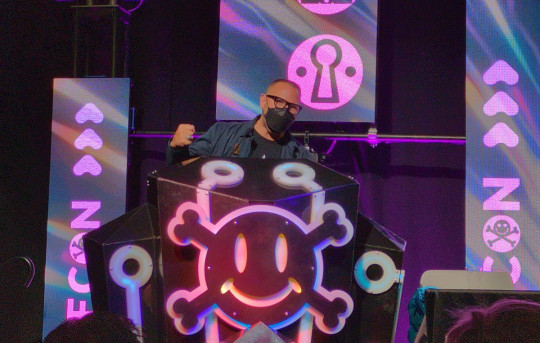
Community voting for SXSW is live! If you wanna hear RIDA QADRI and me talk about how GIG WORKERS can DISENSHITTIFY their jobs with INTEROPERABILITY, VOTE FOR THIS ONE!

If you'd like an essay-formatted version of this post to read or share, here's a link to it on pluralistic.net, my surveillance-free, ad-free, tracker-free blog:
https://pluralistic.net/2024/08/17/hack-the-planet/#how-about-a-nice-game-of-chess

Image: https://twitter.com/igama/status/1822347578094043435/ (cropped)
@[email protected] (cropped)
https://mamot.fr/@[email protected]/112963252835869648
CC BY 4.0 https://creativecommons.org/licenses/by/4.0/deed.pt
#pluralistic#defcon#defcon 32#hackers#enshittification#speeches#transcripts#disenshittify or die#Youtube
925 notes
·
View notes
Text
MOAR SONIC FANKIDS


Me n @nortsauce 's characters!
nort: Davy & Chime Mine (Fly): Wivie & Blink
more about them under the cut!
Name: Wisteria-Vineyard "Wivie/Wivy/YV/Wist/Vinny" Rose Age: 15-16 Pronouns: he/him Basic Description Wivie is an empathetic and upbeat hedgehog created by the master emeralds as a counter weight to a great evil that was spawned in the world. he was found by knuckles and adopted by Amy. Hes obsessed with legends and becoming a hero. unfortunately he kinda sucks at everything and has a lot of work ahead of him. He has a high emotional intelligence and wishes to help people any way he can. After discovering his special abilities he trains under sonic to become control his powers and protect his world and the ones he loves
Extra
at first he looked nothing like a mobian when he was first found but as he grew he seemed to to take a more hedgehog like appearance
Mama’s boy!! Always suspicious abt any of Amy’s girlfriends
Loves skirts and dresses.
can read tarot cards thanks to his mom aswell as palm readings
can skate/hoverboard
Name: Davy “Jokes” Leavian Age: 15-16 Pronouns: she/her Basic Description An aggressive and headstrong girl. She's tough and a skilled fighter and is always ready to show off her talents. She doesn’t talk about her past due to her not trusting who’s in the Codfather’s mafia gang that she is in deep trouble with. She’s obviously connected with the forbidden parts of the deep sea in mobius but never questioned why. She lives on her own, and has trouble keeping friends, but wants to prove herself. Can be blunt but means well.
Extra
Leviathan child
Glows when powered up
can shoot her back “petals” to poison or grab things
Name: Chime (Chee-Mei OR just Chime either works) Age: 15 Pronouns: she/her Basic Description Chime is an excitable girl of few words who is an apprentice of Espio. She’s not always silent but prefers to be as quiet as possible, hard to do when she’s got 100 pound weights on her hair and a bell she never takes off. She’s loyal and loves making friends, but she also is very skilled and deft with any sharp object. She’s precise and cunning, but her lack of any sort of magical or enhanced physical abilities make her a little insecure. She’s said to be a part of a group protecting… something.
Extra
Very Fast and Agile
Skilled in “cutting” weapons (knives, swords, any bladed thing)
Very quiet
likes tea parties
due to her being very quiet and skilled many people feel threatened by her but she's a sweetie
She’s also forced to wear the bell bcs she kept sneaking up and scaring people
Name: Blink the Hedgehog Age: young??? Pronouns: Gender fluid, changes any chance they get Basic Description: Blink an eccentric kid who wants to become as strong as they possible can be. They love to run around and mess with people with pranks, especially at Team Dark. Blink has some violent tendencies because of how they were raised by mercenaries and a war machine, so Shadow tries to keep them away from a lot of people. They have a close but complicated relationship with shadow and a distant relationship with sonic, with either of them barely even knowing that each other existed for the first few years of Blinks life.
Extra
slower than sonic but higher endurance
calls his parents "pops" or by their names interchangeably (great relationship guys 👍)
has a clock on their right glove and a compass on their left glove: this helps blink control and reorient themself after "blinking*" through time and space
Abilities
Blink*: can bring them in and out of existence as a form of "teleportation"
Speed break: bursts of speed that allow them reach point A to point B in less than a second (tracer from OW)
No-Clip (lol) : can phase through objects (generally used during speed breaks)
Time Control (Only With a Chaos Emerald)
#school is almost done so hopefully I can start posting again#sonic the hedgehog#shadow the hedgehog#amy rose#sonic#sonadow#sth#sonic fanart#sonic art#sonic x shadow generations#sonic prime#sonamy#espio the chameleon#team chaotix#espilver#sonic fankid#sonic oc#sonadow fanchild#amy fanchild#sonadow fankid#Blink the Hedgehog#Wivie the Hedgehog#Wivie Rose#Wisteria-Vineyard Rose#Davy the Sea bunny#Davy Jokes Leavian#Davy Leavian#Chime the Shiba Inu#art#my art
92 notes
·
View notes
Note
Staying alive for centuries, if not millennia, and enduring trauma that spans for generations is bound to transform even saints into rats. Day-to-day life in the middle-ages was batshit dystopian (especially in Europe). I'm of the belief that older nations (think england, france, china, india) are far more rat-like and cynical than their much younger counterparts who have witnessed far less war, strife, prejudice and just aren't as burnt out as them (with some major exceptions). Mega bonus points if the youngins received some form of parental care, even if it's not perfect (like zee, australia, alfred).
I love how you emphasize that "Arthur is not a good man". But in his defense, I think none of the oldies are good men. There are personifications that predate Arthur by many millennia (e.g. India, China). To them, Arthur looks like a teenager. They lost power to a pasty little rat completely drunk on power, and so a part of them knows their colonization wouldn't last, so they endure it with an air of haughty annoyance and impatience, I'd like to think. They're still working against Arthur, but there's no seething rage as one might expect. They master the stiff upper lip far, far better than Arthur. Which I imagine makes him envious. I know you don't talk about India or China, but I think their personal interactions with Arthur would be extremely fascinating, be it in the 19th century or present-day. sorry for the long rant, luv your blog
👆👆👆👆👆👆👆👆👆
(I am so sorry i took a millenia to answer this but i always wnated to give a structured and thought out oppinion but never had the time in the last few months to sit down and think.
Having said that Im gonna answer as many older asks as i possibly can. Im sorry once again and your mind is a palace decorated with interesting and fascinating ideas)
So many have come before him. Too many died not having been recorded by the watchfull eye of history.
Arthur is not the oldest of the oldies. He is young compared to someone like China or Syria.
To start off with i think China is the most interesting Helltalia character there is. Just the years and cultures and dynasties and changing political systems and rise to power and fall and rise and again and again. The splitting and putting back together the regions. The innovation and influence. Ahvdnajxbnzksbx
So much creative liberty there and so much to learn and look into.
None of these nations, old or young are good or bad. They also are. In a way that a sparrow is bad for crop growth and good for locust population control.
"Arthur is not a good man" is not a general idea. They are Arthurs own words, about himself. He does not believe himself to be a good man. But then again, there are few nations who think of themselves as 'good' or 'righteous'. Years come and years pass. Now multiply that by a few thousant times. Good decisions lead to bad concequences and bad decisions lead to good ones. Good ideas are good until there are better ones pointing out the horrors of the past ideas. If you try to protect yourself and your family and damn another are you a bad person? Or are you a bad person if you damn your own family to save others? 'Good' is different for every nation. It just so happens that Arthur does not consider who he is to be righteous or benevolent. He has made decisions that damned his own soldiers for the sake of his own blood, his children. But he has sacrificed the lives of his progenies to advance himself and his empire. Its not the fact that he sacrificed his children or soldiers that he thinks make him bad, but he believes his hypocracy to be the thing that makes him "not a good man".
I think the older countries like China, Syria, ancient Rome and Egypt, Norte-Chico, Aksum (etc etc) didnt have what younger nations today got. At least not as frequently and directly. Alfred got a father willing to burn down villages and string up reverends to make sure his son didnt see the hangmans knot ever again. His brother and sister and their weird and tall french brother got to live a life as vomfotable as possible for them at that particular time growing up. They didnt see the world change. They were born into it already having shifted. That goes for other younger nationfolk. Some had harder lives than others but the world was connected and integrated to a certain degree when they were born. Loneliness is the main topic of the ancient nation personifications. If you asked a human in a town or village a few thousand years ago what the characteristics of his nation was he would respond with loneliness and reclusivity. So few knew eachother and fewer interacted regularly. A nation born is a nation doomed or abandoned by their parent nation if they had one. If by death or otherwise.
So what i think really set appart the oldies from the noobs are the inreactions they have with eachother. Old nations have learned and expect the sort of "stiff upper lip" you mentioned more than newer nations. If thats even possible. They grew up lonely, and and to a certain degree every nation is lonely, but the ancient world saw too much. So they stay even more lonely.
As ive mentioned, China is such an interesting character to me. He is very smart and he has lived through double the shit these old Europeans have. The oppium wars is something i studied recently and i kept thinking of how Yao would see all of this: "the gall of that young man to come to my shores and demand to do proper business while pointing a loaded gun to my head".
And after a few more decades he sees this European powerhouse get knocked down by none other than the mans very own bastard boy. As a human man, Yao finds comfort and amusment in that. The irony is rich and plentiful. The revenge tastes sweet.
But as a nation, that is extremly scary. The higherarchy is changing, so that means he has to change. And if he has to change that means old wounds will be reopen and new ones will take their place beside the old ones. And he does change. He adapts and tries to understand. Lots of new wounds are reddening his clothes. Lots of new wounds are reddening the clothes of others. In that change, there is loneliness. He keeps it to himself. Saving face is what he knows how to do. Just as most nations do.
Yao has long ago decided to drop the words good/bad from his personal lexicon. The concept of good is noble but not advantageous when it comes to their kind. Nations are purely bad in some situations, yet they are entirely good in others.
Anyyywayyyyy, im rambling too much at this point. I might do more hcs on China, but i think i should stop here for now. This isnt coherent or logical so lemme stop myself from further embarassment lol
#im dying this is too long nsjsjdnnsjsj#fuck man im sorryyyy#i loev the ask i saw it and i think about it every once in a while#hetalia#ask meli#hws england#hws china#my headcanons#historical hetalia
71 notes
·
View notes
Note
So we have Survivor Nort Decucts... And now we have Hunter Nort deducts... Put them together and what do we get?
You get a hella tragic story oh my GOSHHHH 😭😭😭😭
The set up will be: 1-Surv!Norton 1-Hunt!Norton -Then my thoughts 😏
1-Kindness: Is that an Olive Branch you just threw or... (A Good Deed: Norton, a Miner, Always visited the hospice and cared for all of the homeless old miners) 1-Shrewd 'Each step requires long-term planning' (Shrewd: An old, folded letter: Yellow and brittle. It was once abandoned in a dust corner. Signed, Benny.) -This is interesting 👀 These are both the first which automatically makes me think they are connected. I wonder if the Olive Branch thrown is from Benny? Or if its from Norton with the helping out with the people around Benny? Either way Benny ends up sending a letter to Norton. Maybe it saying something like 'want to meet up? I have stuff that might interest you' or something. Which adds to my -squinting- at Benny. Sounds like Norton was alone even though Benny was around all that time? hmmm
2-Diligence: The more effort, the more rewards? (Work Record: Norton Campbell is always the first to go down into the mines and the last to leave it.) 2-Lonely: 'The loneliness of separation must be endured on the climb up' (A coin: Stained by ash, footprints, tears, and dirt from the slums.) -Brings up the whole 'he had nobody' not even Benny vibe again -squints- Where was Benny during all of this? Seems like Norton would work and work and work so he couldn't feel or notice how alone he is. Like work was his only constant and 'friend' to keep himself from going nutty, but in the hours where work couldn't be used as a distraction he was miserable 😿Crying as he clings to what little he has...my gosh. That coin was so important to him man, I wonder if it was the last thing he got from his dad or something, cause he takes it everywhere and it pops up all the time in the trailer orz which means he never spent it just held onto it enough where you see TEAR STAINS ON IT! I CANNOT-- 😭😭😭😭
3-Efficiency: We need more trials. (A stack of Recommendation Letters: It can be seen that every one of Norton's previous employers appreciated his hard work and expressed their regret at being unable to keep him for long.) 3-Sophisticated 'wear a mask for the sake of survival' (A note on the back: What a detestable Person! Wagging his tail like a dog in front of the overseer!) -This one I can’t quite grasp yet -squints- is this referring to the back of the letter from Benny? Why write that there? Is Benny talking smack about Norton being so good at wearing a mask and pleasing the employers? Or is Norton talking smack about himself? Or is Norton pissed about others doing what he is doing? Wearing a mask to just survive or what the heck? 🤣 This one is still baffling me fr fr Oh wait a min....Seems like he had to jump job from job cause employers kept needing to fire workers, unable to keep him on as an employee. Likely becoming more jaded that him working hard and being good isn't working much for him since he keeps getting let go. Then seeing some fresh faced bushy tailed worker beside him would likely piss him off lol 'Why are you acting like that we are all getting fired anyways' Yea I super don't know with this one, I am juggling so many possibilities for this one.
4-Persistence: People won't be unlucky forever, right? (1-Page Note: There are 13 items listed. The first 12 appear to be names of places, and the last one is crossed out.) 4-Willful 'Those who persist will encounter more opportunities' (A page from a diary: I found that old man's notes. Now, it belongs to the one who lives long.) -He doesn’t sound all that fond of Benny pff like there is a hint of a dig there and/or him trying to convince himself that he is going to break out of here and live. Did he decide to set a plan in motion after getting the letter from Benny? Or was it after meeting with Benny?
5-Patience: Next time... (Diary: Tomorrow, I will go to the last place recorded by the old man. If there's still nothing, then I hope he...) 5-Gloomy 'The other side of Kindness and affability' (Abandoned junk: A tattered quilt, a chisel, an unsent letter, and a small piece of wrapped and hardened white bread) -This one I don't see much of a connection other than reference to old man and then there is that QUILT that could have possibly been the one Benny had made for Norton when the Dad was still alive. 'Then I hope he...' sounds hella ominous now lol -squints- Then Is this stuff found with Benny or was it found where Norton abandoned everything? Did Norton not send a letter? Maybe he meant to go back to get his things but never got to cause of the damage the explosion deed had on his mind ah. This one also gives me more questions than answers lol
6-Courage: The more dangers, the more opportunities. (A Geological Report: Part of the tunnel had been blocked by an unidentified object. One small mistake could cause the inner structure of the mine to collapse.) 6-Greedy 'Merely retaking what the heavens owe' (A map: Several crossed-out mines and a red circle.) -I am thinking Greedy and Gloomy should switch here cause Greedy goes well with the Patience with reference to 'go to the last place recorded' BUT what the frig is that 'unidentified object' -squints- Did Norton set that up?? Was that in the red circled mine? Was the place just found like that and Norton was like -cough cough- "whatever nothing is stopping me". Is this all just setting up how Norton was willing to go anywhere to find what he is looking for? hmmmm Willing to go where no man has gone before. Smash Greed and Courage together and ya thats what you get lol A desperate dude that has nothing to loose and only to gain if this all goes right. aahh
7-Alert: You need to be more cautious. (News: Due to the use of gunpowder and detonators, the era of simple rock drilling is coming to an end. 7-Arrogant 'Only by being bolder can you challenge destiny' (Torn paper: Record the blasting's depth, distance between holes… and the amount of explosives used.) -He uhhhhh, yea he definitely ends up using explosives lol. And its interesting that he made sure that everything was measured and counted in every way. Bro knew what he was doing 1000%. He had it all down to the second, the inch! He was careful alright, careful to make sure this goes perfect AH
8-Share: You need more helpers. (Mining Precautions: Theft of explosives is illegal and will be reported to the police once discovered.) 8-Hypocrite 'Important moments must be witnessed by companions' (A memo: Two bottles of the cheapest whine for those drunkards to wet their throats. And toss some fatty meat to the guard dog.) -BRO STOLE THE HELL OUTTA THEM EXPLOSIVES LOOOOOOOL AND HE DID IT IN THE MOST CLICHE WAY EVER AND IT WORKED IIMMMMM--LOOOOOOOOOOOOOL Like How many laws did he end up breaking by the end of all this?? LIKE GEEZZ And people are so used to him being kind and caring, none were the wiser! This Duddddeeeee!! He played the LONG GAME GOLLY
9-Wisdom: Smart people know when to hold on and when to let go. (An Accident Report: An explosion collapsed a mine on the outskirts of the city. It's suspected that the miners had mishandled the explosives, and the police expressed that there's little chance for anyone to survive) 9-Ruthless 'Exploding from deep within like an ignited explosive' (A page from a diary: Those journalists and policemen are gone. So it's just that simple?) -Bro played everything! The people, the system, the science, the math?? LIKE DUDE! If it was an accident, he wouldn't have survived. Norton had this planned to the T! Every 'i' was dotted and ever 't' was crossed, he knew he was surviving that explosion if everything went perfect like he was planning for OH MY GOSH. Bro playing chess while everyone else was LEARNING CHECKERS
10-Luck: That's only because the rest are just unlucky. (1-Page Case: Moderate burns to the face. Suspected to have been caused by direct exposure to excessive temperatures) 10-Numb 'Forget them and stay away from the dark underground' (A magnet: "Maybe it can keep me away from misfortune and darkness.") -He really didn't get much out of this did he. Like, all he got was trauma, burnt up, and a magnet. And boi is he clinging to that magnet with is all. His new coin; his new thing to cling to orz He really lies to himself a lot 😿He keeps finding out far too late that what he thought would change everything just made everything worse 🙃like yes everything changed, but changed for the worst. That tunnel vision hitting him so hard he never stops to go 'huh, this is a horrible idea, how would this possibly change my fate??' Its like he is trying so hard to convince himself that it was all worth it cause he got this crazy magnet orz gooooossshhhhhhhhhhhh Instead of using this as a wake up call it seems he is pressing on that sigma grind. Nothing like a plague doctor bird man monster to set things right LOOOOL
#bro has my head WHIRRRLLLLIINNGGGGG LOL#I feel like I forgot to add a load of other thoughts but i can't think of them rn#norton campbell#identity v#idv prospector#idv#idv norton#identity v norton#idv norton campbell#identity v prospector#idv fools gold#idv fool's gold#idv theory#identity v theory#ask#asks#minty answers#minty speaks
28 notes
·
View notes
Text
despite how important c!Nort is to me (we literally share the same name) I haven't talked about him much here and now that I've posted my recent animation I feel like it's due time, esp if I'm ever gonna talk more about OC's.
Here's a short guide to c!Nort :D

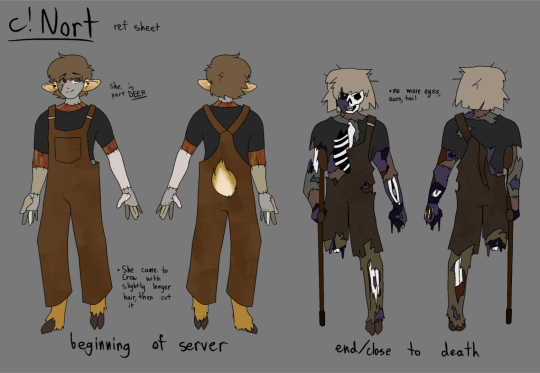


(this art is in order of oldest to newest, you can see how much they've changed over the years :'D)
Tw for topics like death, bodily decay, mild parental abuse, and just general angst lmao
c!Nort is an oc of mine that comes from a lore-centric Minecraft RP server with friends that was most active from late 2021-early 2023. I'm very emotionally attached to him, because we grew and changed and developed as people together. He's sorta like a sona in that way.
Some base knowledge of the server: it took place in a town called Crow, where the three gods of the realm liked to visit. One was in charge of life (overworld), one was death (nether), and the last was the afterlife (end).
Nort's backstory before Crow is that he is sort of a wayward soul that the gods of the nether and end struggled to control, and ended up coming back to life as a zombie centuries after he first died. In his first life, he was adopted by a cruel war general, who taught him to be ruthless and violent. The servants of their mansion eventually had enough of them, and plotted to murder them, sneaking poison into their food.
Centuries later, Nort comes back to life and has an identity crisis, and somewhere along the way realizes he can't go on being who he was before, he needs to be better. So he makes his way to Crow and turns an old, dilapidated shack into his house. There, he tried very very hard to be super nice to people. It's very exhausting for him and he worries he's still not being nice enough.
But because he was a zombie, he was consistently decaying and falling apart, so he'd use deer parts to put himself back together.
Backstory aside, Nort was involved in many lore events, some of my own making, some not. He got wrapped up in the server's joke PETA group and that pissed off the god of the Nether. He also accidentally chased someone's fox off a cliff.
But more importantly, he, alongside four others were the first to interact with the god of life's other half, a nasty plotting decay god who made everything turn into skulk.
Speedrunning this big arc, we made a deal with the decay god to work for him but ACTUALLY spied on him but everyone still kinda thought we were evil. During the big final showdown the god of decay brought everyone to this incredible floating island castle and spawned a bunch of wardens everywhere and it was chaotic and we killed them all and it was wonderful.
After that, Nort's decay sped up and he knew he'd die soon. I turned this into a lore event by announcing his death alongside sharing a massive build of his childhood home that people could explore and piece together his backstory via diaries.
A year goes by and I get bored of being canonically dead so me and my bestie conspire to have her character bring mine back from the dead. She's an incredible writer, and I draw, so we put together a 6(?) part mixed-media story with writing and illustrations that culminated in a small event on the server. I'm still very proud of us for that one.
Fast forward to current day Nort, he's living in Crow and working at a lovely inn and tavern with his adopted mum, and is very very happy.
So that's my little guy c!Nort. Hope u enjoyed the lore dump, here's some more art from over that time period!
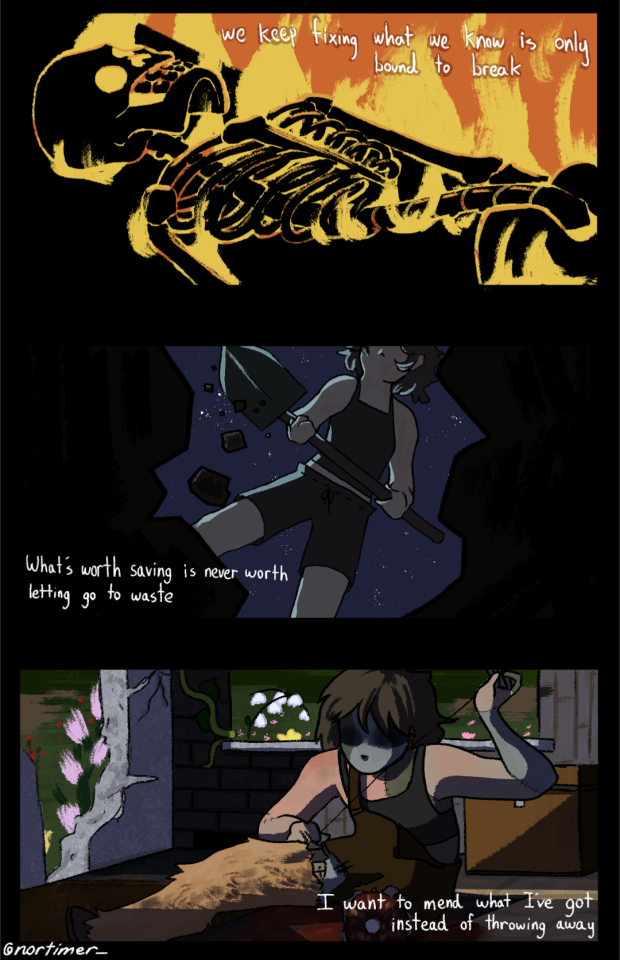





#nort art#nort yapping#nort ocs#can you tell we transitioned together#as i realized i was a man so did he#and then i built it into the lore for fun too :3
2 notes
·
View notes
Note
Uno parpadea y ya está navidad a la esquina, así que como continuación de la comida argentina, hoy tenemos comidas navideñas argentinas:
Sándwiches de miga: un sándwich que usa un pan de miga, sabroso en textura y sabor. Usualmente se le pone jamón y queso, pero también puede llevar tomate, jamón crudo, queso, lechuga, etc
Helado: el helado es el postre más popular en las calurosas navidades argentinas. De hecho junto con la carne, el helado es de las comidas que más consumen los argentinos
Ensalada rusa: una ensalada que típicamente lleva papa, zanahoria, jamón y mayonesa. Hay muchas versiones, la original llevaba carne de codorniz y trufas, pero la actual se originó en la clase trabajadora de la unión soviética, el lugar de origen de esta ensalada
Arrollado de carne: una carne plana que se rellena con huevos, pimientos entre otras cosas. Se puede hacer al horno, o hervirlo
Arrollado: el arrollado es un pan de miga relleno usualmente con atún, aceitunas y huevo, aunque también se puede hacer dulce
Mantecol: un postre hecho con almíbar y mani, el mantecol es un postre muy típico en estas fechas, es adictivo. Aunque engorda fácilmente, un poco de vez en cuando no hace mal
Budín, Pan dulce: una especie de pan que puede ir relleno de frutos secos, pasas, frutos secos, o de chocolate. El budín es esencialmente lo mismo
Extra: no es comida de halloween, por qué en argentina no se celebra mucho. Lo más cercano que tenemos es en el norte, donde celebran el día de muertos
(Translated with Google Translator)
One blinks and Christmas is around the corner, so as a continuation of Argentine food, today we have Argentine Christmas meals:
Crumb Sandwiches: A sandwich using a crumb bread, tasty in texture and flavor. Ham and cheese are usually added, but it can also include tomatoes, raw ham, cheese, lettuce, etc.
Ice Cream: Ice cream is the most popular dessert during the hot Argentine Christmas. In fact, along with meat, ice cream is one of the foods that Argentines consume the most.
Russian salad: a salad that typically has potatoes, carrots, ham and mayonnaise. There are many versions, the original had quail meat and truffles, but the current one originated in the working class of the Soviet Union, the place of origin of this salad
Meat roll: a flat meat that is filled with eggs, peppers among other things. It can be baked or boiled.
Arrollado: Arrollado is a crumb bread usually filled with tuna, olives and egg, although it can also be made sweet.
Mantecol: a dessert made with syrup and peanuts, mantecol is a very typical dessert on these dates, it is addictive. Although you gain weight easily, a little from time to time doesn't hurt
Pudding, Sweet bread: a type of bread that can be filled with nuts, raisins, nuts, or chocolate. Pudding is essentially the same Extra: it is not Halloween food, because in Argentina it is not celebrated much. The closest we have is in the north, where they celebrate the day of the dead
-----
Very educational, thank you! This kind of stuff is inspiring. I will be making more cuisine posts in the future, and it never occurred to me to make holiday-themed ones until you sent this.
I googled some these dishes to see what they look like, and they all look amazing. If I could eat peanuts, I would make some mantecol right now! I know that peanuts are very high-calorie, so this seems like this food would be popular with heavyweight species on Looming Gaia. I bet the Etiosi people eat this a lot.
*
Questions/Comments?
Lore Masterpost
Read the Series
5 notes
·
View notes
Text
A little of everything
Tomorrow we saw a sliver of Chapultepec park, but there were at least 66% that we didn't see and there were a few places I wanted to visit so we did that this morning. We took a taxi right away up the hill to the north side of the west part of the park where there was a large playground. It actually was locked until 9AM so we detoured to get some pastries for breakfast first (a saga of it's own....the service could not have been more painfully slow!) but it was great to walk through the park early in the morning. It seemed that every walker, runner, and cyclist in Mexico City was out (I wonder if Good Friday is a holiday here - side note: for such a seemingly religious country, churches and otherwise religious elements are barely part of the experience, so much unlike in Europe).
Hannah had her fill running around one of the largest playgrounds I've ever seen (the Tapatia playground) and then we dragged her out of the park to see a famous sculpture fountain with a design best seen from above. This part of the park had four giant sculpture things that were apparently used as part of the water system many years ago, and then we took a long walk through the Condesa neighborhood to get to the Roma neighborhood, which we hadn't explored yet. We walked through some of the areas that don't seem the nicest, but honestly didn't feel unsafe or uncomfortable at all. We also noticed some cable cars overhead and learned later than there are several lines in Mexico City (like in Medallin) and that one is the longest public cable car line in the world! But having just read about a cable car crash on a line that I rode in Italy, I think we were ok to skip the ride for now (although it would have been a great experience for Hannah!)
We stopped in Parque Mexico for another great playground experience. We ran into the same family from California that we met the other day - what are the odds! We also had some more of the best mango from a street vendor. Then we took a walk to have lunch in Roma Norte - there are many English speaking tourists here; more than we've seen elsewhere. After lunch we walked to the Chocolate Museum in the Juarez neighborhood; still beautiful but definitely grittier. The museum was a disappointment mostly to Hannah who was expecting to taste lots of chocolate, but had some fun interactive activities for her. To make up for the lack of chocolate tasting, we walked to a nearby chocolate bar and got some chocolate milk in bowls, and then explored the heart of the Roma neighborhood. There is so much happening here - it's packed with people but with beautiful buildings, streets, and a million fancy places to eat. We visited the Museum of Objects for a quick and easy stop (museums here are everywhere and also super affordable - $3-5 a person!)
We made an obligatory stop at Panderia Rosetta to get some pastries and then walked to the Plaza Rio de Janeiro and stumbled upon a very makeshift "playground". Hannah befriended a 7 year old Mexican girl and we did what we could to help them communicate - they ended up playing for about an hour! Because it's the dry season here, everything is pretty filthy and covered with a layer of dust so after three playgrounds, Hannah was pretty disgusting.
Despite the multitude of Michelin star restaurants and other fancy places to eat, with our limitations on anything really spicy and the vegetarian constraints, it's just easier to go someplace simple, which we did tonight. We stopped at a well known taco spot and had some really delicious food without the cost, time, and snootiness.
A nice walk home in the perfect evening temperatures and some ice cream near our apartment were how things wrapped up for the day.





(chocolate on the walls)





0 notes
Text
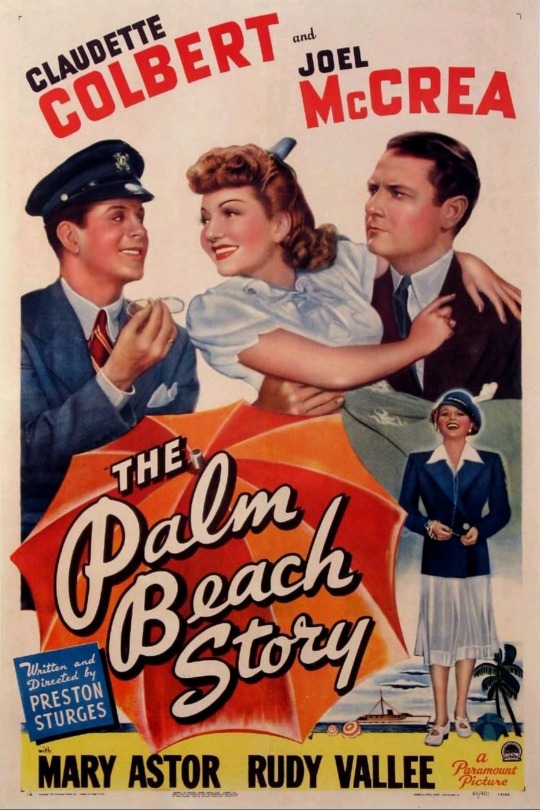
Um Marido Rico
EUA 1942
Preston Sturges
8/10
Um Divórcio Louco
The Palm Beach Story pertence ao estrito grupo das mais divertidas e memoráveis screwball comedies dos anos 30 e 40. Não propriamente por ser um excelente filme, na verdade nenhuma destas distintas comédias são excelentes filmes, na verdadeira aceção da palavra, mas precisamente por possuir aquele ritmo e loucura alucinantes, que tão bem caracterizam o género e conquistaram o público e a posteridade.
É impressionante pensar que este filme foi produzido enquanto o mundo estava em plena segunda guerra mundial. Este e muitos outros, alguns até parodiando a própria guerra, como o famoso To Be Or Not To Be de Ernst Lubitsch. São obras quase exclusivamente elaboradas em estúdio e que vão (tal como os musicais) precisamente ao encontro daquilo que o público precisava na altura, loucura saudável, ligeireza, glamour e boa disposição, que os afastasse, nem que fosse por apenas hora e meia, das agruras da realidade.
Aqui temos a sempre magnífica Claudette Colbert, a personificação feminina da screwball comedy em pessoa, acompanhada de um Joel McRea, também experiente no género, além dos surpreendentes Rudy Valee, um eterno secundário, mas com presenças assíduas nas comédias da década de 40, e a luso descendente Mary "Vasconcellos" Astor, que tinha acabado de vencer um Óscar de melhor atriz secundária em 1941, pelo drama The Great Lie, ao lado de Bette Davis e George Brent, que se mostrou igualmente versátil no film noir (The Maltese Falcon com Humphrey Bogart), e também em diversas comédias (Midnight, com Claudette Colbert e Don Ameche, There's Always a Woman, com Melvin Douglas e Joan Blondell), em gangster movies (The Little Giant, com Edward G. Robinson), ou em policiais (The Kennel Murder Case, com William Powell). Uma grande senhora do cinema norte americano das décadas de 30 e 40.
Um filme obrigatório para os amantes do género, que são muitos.
A Crazy Divorce
The Palm Beach Story belongs to the strict group of the most entertaining and memorable screwball comedies of the 30s and 40s. Not exactly because it is an excellent film, in fact none of these distinguished comedies are excellent films, in the true sense of the word, but precisely because it has that mind-blowing rhythm and madness, which so well characterize the genre and conquered the public and posterity.
It's amazing to think that this film was produced while the world was in the midst of World War II. This and many others, some even parodying war itself, like the famous To Be Or Not To Be by Ernst Lubitsch. These are works almost exclusively produced in the studio and which (like musicals) meet exactly what the public needed at the time: healthy madness, lightness, glamour and good humor, which would distance them, even if only for an hour and a half, from the hardships of reality.
Here we have the always magnificent Claudette Colbert, the female personification of the screwball comedy, accompanied by Joel McRea, also experienced in the genre, as well as the surprising Rudy Valee, an eternal supporting actor, but with regular appearances in the comedies of the 40s, and the Portuguese descendant Mary "Vasconcellos" Astor, who had just won an Oscar for best supporting actress in 1941, for the drama The Great Lie, alongside Bette Davis and George Brent, who proved herself equally versatile in film noir (The Maltese Falcon with Humphrey Bogart), and also in several comedies (Midnight, with Claudette Colbert and Don Ameche, There's Always a Woman, with Melvin Douglas and Joan Blondell), in gangster movies (The Little Giant, with Edward G. Robinson), or in police films (The Kennel Murder Case, with William Powell). A great lady of North American cinema from the 30s and 40s.
A must-see film for lovers of the genre, of which there are many.
0 notes
Text
when no one's watching..
dokyeom sat curled up by the wide hotel window, the soft instrumental playing in his earphones barely drowning out the swirl of thoughts in his head. the stars outside were glowing, scattered across the sky like quiet reminders of how small everything seemed from afar. yet inside him, everything felt overwhelming, loud, tangled… heavy.
the upcoming performance at the tecate pa'l norte festival was supposed to be his focus - and it was, in part. of course he was excited, performing in front of international fans always gave him a special kind of joy. but alongside the excitement, anxiety crept in like a shadow he couldn’t shake. he wanted to be perfect- not just for himself, but for the fans, for the team. it was kind of funny how he would still get so nervous before any performance, even after all these years as a singer. he knew everyone was expecting him to shine. and he would. he always did. but what no one saw, what he never let show, was how much he had been carrying behind the smile.
the end of the year wasn’t that far now, at least not for him. his military enlistment sat on the horizon like an approaching train, one he couldn’t stop, couldn’t slow down no matter how much he wished he could. the fear he felt wasn’t loud or dramatic as he usually was. no, this one was quiet. constant. a dull throb in the back of his heart that followed him everywhere. even if he didn't want to admit it to himself, he was scared of the unknown- of how much everything would change, of what he’d miss, and worst of all, of being forgotten. he had worked so hard to build this life, this love with the fans, this place on the stage that felt like home. what if stepping away made it all disappear? what if when he came back, it just wasn’t the same?
buried underneath those fears was something even harder to face- doubt. what if he lost touch with the version of himself that he knew best? what if he came back and couldn’t catch up? what if he wasn’t enough anymore?
as the music shifted into another soft track, he let his eyes fall shut for a moment, exhaling softly. he was going to miss his parents and his sister- their messages, their voices, the comfort of knowing they were just a phone call away. how he would run to them every time he was able to visit, to spend time with them and make so many amazing memories. he was going to miss the little everyday moments with his members- the teasing, the late night meals, the unspoken understanding they shared after so many years together. the monthly meetings they always had and the feeling that he was exactly where he belonged.
he leaned his head against the window, the cool glass grounding him as his thoughts shifted again- to her. the one he had slowly, cautiously started getting so close to again. it had been months of messages, quiet check-ins, quick meetings and sometimes a sleepover. moments that reminded him of what they once had- the laughter, the softness, the way she made him feel understood. he had never stopped loving her, not really. but they had let each other go because their lives, especially his, had been too full, too chaotic. he had been too busy- always somewhere else, always in motion.
and now, just as something gentle was starting to bloom between them again, he found himself frozen. should he take that step forward? could he offer her the kind of love she deserved, when soon he’d be gone for a year and a half? when even now, his schedule swallowed his days and left him exhausted more often than not? he was terrified of hurting her again- of neglecting her, of repeating the same patterns that had pulled them apart the first time. he didn’t want to ask her to wait for him, not if he couldn’t promise her something real, something steady, but before he could notice, that's exactly what he kept doing nevertheless.
his heart ached with the weight of everything he wasn’t saying. to his fans. to his family. to his members. to her. everyone saw him as the light- the smile, the energy, the one who always lifted the room. and he wanted to be that, truly. everyone would say dokyeom had a gift, not just his voice, but his ability to shine even when he was hurting. he bore his worries in silence, not out of pride, but out of love- he didn’t want anyone to worry, especially the fans who looked to him for strength and warmth. so he gave them his brightest side, even on his darkest days. however, there were nights like this where the brightness felt like a costume, and underneath it was just a man sitting by a window, scared of being left behind by the world he loved so much.
the stars watched in silence, offering no answers, only their distant comfort. he didn’t know what the right path was- for his future, for his career, for his heart. but tonight though, under the quiet sky, he allowed himself a rare pause. just him, his favorite music playing, the stars, and all the feelings he kept tucked away. he wasn’t sure what the future held, but for now, he let himself feel it all. the excitement, the fear, the love, the longing. and somehow, in the stillness of that moment, it all felt a little more bearable.
1 note
·
View note
Text
Related to this post, I’ve actually got a few characters in that same setting who I wanna talk about, so, here’s the first.
Luís Rocha Ramos, Homem Invencível
Background: Within the ranks of the Novo Cangaço, no name is as lauded or feared as that of Luís Rocha Ramos. Native to the harsh deserts of the Sertão, Luís’s early life was spent in Juazeiro do Norte, and while he has shared little of his childhood, it has been gleaned his home life was not the greatest, often being neglected by his parents, meaning he mostly spent his childhood alone. However, his life changed when at the age of only twenty he found himself working as a hired gun for the Comando Vermelho, where he took his newfound infamy as the attention he sought all his life. It was apparent he was naturally gifted in the ways of violence, quickly establishing himself as a talented gunslinger and a braggart, proving himself in turf wars waged against the Terceiro Comando Puro and Primeiro Comando da Capital, along with the many bloody fights that broke out between his operation and the military police. Though, as with many other people, his life was turned upside down when in the Bombing, cities reduced to rubble and criminal organizations floundering at the sudden societal upheaval, however, it could be argued Luís got away rather well off, all things considered. He and his men fled the cities to the Sertão, hiding away in the rolling deserts. However, while in Poland plots of rebellion began to brew, Luís was already ready to start fighting, however, the people of Brazil were not ready to fight such an otherworldly foe just yet, leaving him and his men on their own. During this time of guerrilla warfare and social banditry, Luís had his first of many brushes with death when an Invader rifle took off his right arm, though he almost bled out, Luís supposedly joking “Ele pegou meu braço, eu tirei a vida dele, foi uma troca justa”. His acts of violence against the Invaders continued in this vein till 2234, when the rebellion truly began. Luís quickly found himself a hero, credited with founding what would become the Novo Cangaço, and to this day he will not let anyone forget that.
Physical Profile: Luís Rocha Ramos is more metal than man now, having lost both his legs, large swaths of his brain, his right arm, his left eye, many of his spinal vertebrae, and his heart, just to name a few, also, apparently his left arm has been reinforce in order to survive the kick of his .600 Nitro Express revolver. However, underneath all the cybernetics, he is a rather conventionally attractive man in his 30s, with a strong jawline, hazel eyes, and what used to be a full head of hair, however all but his beard had to be shaved off during his repairs. He stands 1.90 meters tall and 204.117 kilograms with the cybernetics. Usually he wears a camo duster and combat boots paired with cargo pants and a half-moon shaped hat, similar to the ones the Cangaço wore.
Physiological Profile: The biggest issue with Luís seems to be his attention seeking issues, he cannot stand to not be the topic of conversation and tends to hog the limelight, combine this with his strange obsession with killing and fighting, and it’s clear he is a someone disturbed man, however he is rather good at hiding this, many who have met him have though him charming and charismatic, how much of this is an act is currently unknown.
Combat Skills: Always wanting to be the center of attention, he bursts from the ruins of the cities and sands of the desert with as much flair as he can, trying his hardest to embody the tactics of Shock and Awe. When he cannot perform a mission obviously, he usually leaves calling cards to mark his movements. This has actually lead to some unintentional physiological effects: no Invader stationed in the Latin America area hasn’t heard of Luís Rocha Ramos, and few but the most hardened veterans want to meet him, as his bravado is matched by his actual skills, having plenty of bite to match his bark in the form of his Pfeifer-Zeliska .600 Nitro Express Revolver. Along with all of this, the opposite effect is true, he is a hero throughout the human populations, the men under him fighting harder simply knowing the Homem Invencível is somewhere with them.
1 note
·
View note
Text
Aug 2024)
Today's links
"Disenshittify or Die": My speech from Defcon 32.
Hey look at this: Delights to delectate.
This day in history: 2009, 2014, 2019, 2023
Upcoming appearances: Where to find me.
Recent appearances: Where I've been.
Latest books: You keep readin' em, I'll keep writin' 'em.
Upcoming books: Like I said, I'll keep writin' 'em.
Colophon: All the rest.
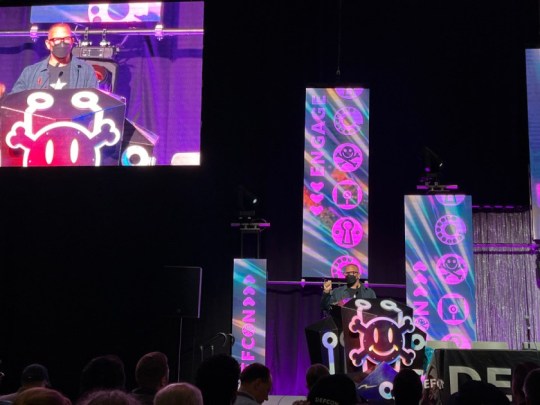
"Disenshittify or Die" (permalink)
Last weekend, I traveled to Las Vegas for Defcon 32, where I had the immense privilege of giving a solo talk on Track 1, entitled "Disenshittify or die! How hackers can seize the means of computation and build a new, good internet that is hardened against our asshole bosses' insatiable horniness for enshittification":
https://info.defcon.org/event/?id=54861
This was a followup to last year's talk, "An Audacious Plan to Halt the Internet's Enshittification," a talk that kicked off a lot of international interest in my analysis of platform decay ("enshittification"):
youtube
The Defcon organizers have earned a restful week or two, and that means that the video of my talk hasn't yet been posted to Defcon's Youtube channel, so in the meantime, I thought I'd post a lightly edited version of my speech crib. If you're headed to Burning Man, you can hear me reprise this talk at Palenque Norte (7&E); I'm kicking off their lecture series on Tuesday, Aug 27 at 1PM.
==
What the fuck happened to the old, good internet?
I mean, sure, our bosses were a little surveillance-happy, and they were usually up for sharing their data with the NSA, and whenever there was a tossup between user security and growth, it was always YOLO time.
But Google Search used to work. Facebook used to show you posts from people you followed. Uber used to be cheaper than a taxi and pay the driver more than a cabbie made. Amazon used to sell products, not Shein-grade self-destructing dropshipped garbage from all-consonant brands. Apple used to defend your privacy, rather than spying on you with your no-modifications-allowed Iphone.
There was a time when you searching for an album on Spotify would get you that album – not a playlist of insipid AI-generated covers with the same name and art.
Microsoft used to sell you software – sure, it was buggy – but now they just let you access apps in the cloud, so they can watch how you use those apps and strip the features you use the most out of the basic tier and turn them into an upcharge.
What – and I cannot stress this enough – the fuck happened?!
I’m talking about enshittification.
Here’s what enshittification looks like from the outside: First, you see a company that’s being good to its end users. Google puts the best search results at the top; Facebook shows you a feed of posts from people and groups you followl; Uber charges small dollars for a cab; Amazon subsidizes goods and returns and shipping and puts the best match for your product search at the top of the page.
That’s stage one, being good to end users. But there’s another part of this stage, call it stage 1a). That’s figuring out how to lock in those users.
There’s so many ways to lock in users.
If you’re Facebook, the users do it for you. You joined Facebook because there were people there you wanted to hang out with, and other people joined Facebook to hang out with you.
That’s the old “network effects” in action, and with network effects come “the collective action problem." Because you love your friends, but goddamn are they a pain in the ass! You all agree that FB sucks, sure, but can you all agree on when it’s time to leave?
No way.
Can you agree on where to go next?
Hell no.
You’re there because that’s where the support group for your rare disease hangs out, and your bestie is there because that’s where they talk with the people in the country they moved away from, then there’s that friend who coordinates their kid’s little league car pools on FB, and the best dungeon master you know isn’t gonna leave FB because that’s where her customers are.
So you’re stuck, because even though FB use comes at a high cost – your privacy, your dignity and your sanity – that’s still less than the switching cost you’d have to bear if you left: namely, all those friends who have taken you hostage, and whom you are holding hostage
Now, sometimes companies lock you in with money, like Amazon getting you to prepay for a year’s shipping with Prime, or to buy your Audible books on a monthly subscription, which virtually guarantees that every shopping search will start on Amazon, after all, you’ve already paid for it.
Sometimes, they lock you in with DRM, like HP selling you a printer with four ink cartridges filled with fluid that retails for more than $10,000/gallon, and using DRM to stop you from refilling any of those ink carts or using a third-party cartridge. So when one cart runs dry, you have to refill it or throw away your investment in the remaining three cartridges and the printer itself.
Sometimes, it’s a grab bag:
You can’t run your Ios apps without Apple hardware;
you can’t run your Apple music, books and movies on anything except an Ios app;
your iPhone uses parts pairing – DRM handshakes between replacement parts and the main system – so you can’t use third-party parts to fix it; and
every OEM iPhone part has a microscopic Apple logo engraved on it, so Apple can demand that the US Customs and Border Service seize any shipment of refurb Iphone parts as trademark violations.
Think Different, amirite?
Getting you locked in completes phase one of the enshittification cycle and signals the start of phase two: making things worse for you to make things better for business customers.
For example, a platform might poison its search results, like Google selling more and more of its results pages to ads that are identified with lighter and lighter tinier and tinier type.
Or Amazon selling off search results and calling it an “ad” business. They make $38b/year on this scam. The first result for your search is, on average, 29% more expensive than the best match for your search. The first row is 25% more expensive than the best match. On average, the best match for your search is likely to be found seventeen places down on the results page.
Other platforms sell off your feed, like Facebook, which started off showing you the things you asked to see, but now the quantum of content from the people you follow has dwindled to a homeopathic residue, leaving a void that Facebook fills with things that people pay to show you: boosted posts from publishers you haven’t subscribed to, and, of course, ads.
Now at this point you might be thinking ‘sure, if you’re not paying for the product, you’re the product.'
Bullshit!
Bull.
Shit.
The people who buy those Google ads? They pay more every year for worse ad-targeting and more ad-fraud
Those publishers paying to nonconsensually cram their content into your Facebook feed? They have to do that because FB suppresses their ability to reach the people who actually subscribed to them
The Amazon sellers with the best match for your query have to outbid everyone else just to show up on the first page of results. It costs so much to sell on Amazon that between 45-51% of every dollar an independent seller brings in has to be kicked up to Don Bezos and the Amazon crime family. Those sellers don’t have the kind of margins that let them pay 51% They have to raise prices in order to avoid losing money on every sale.
"But wait!" I hear you say!
[Come on, say it!]
"But wait! Things on Amazon aren’t more expensive that things at Target, or Walmart, or at a mom and pop store, or direct from the manufacturer.
"How can sellers be raising prices on Amazon if the price at Amazon is the same as at is everywhere else?"
[Any guesses?!]
That’s right, they charge more everywhere. They have to. Amazon binds its sellers to a policy called “most favored nation status,” which says they can’t charge more on Amazon than they charge elsewhere, including direct from their own factory store.
So every seller that wants to sell on Amazon has to raise their prices everywhere else.
Now, these sellers are Amazon’s best customers. They’re paying for the product, and they’re still getting screwed.
Paying for the product doesn’t fill your vapid boss’s shriveled heart with so much joy that he decides to stop trying to think of ways to fuck you over.
Look at Apple. Remember when Apple offered every Ios user a one-click opt out for app-based surveillance? And 96% of users clicked that box?
(The other four percent were either drunk or Facebook employees or drunk Facebook employees.)
That cost Facebook at least ten billion dollars per year in lost surveillance revenue?
I mean, you love to see it.
But did you know that at the same time Apple started spying on Ios users in the same way that Facebook had been, for surveillance data to use to target users for its competing advertising product?
Your Iphone isn’t an ad-supported gimme. You paid a thousand fucking dollars for that distraction rectangle in your pocket, and you’re still the product. What’s more, Apple has rigged Ios so that you can’t mod the OS to block its spying.
If you’re not not paying for the product, you’re the product, and if you are paying for the product, you’re still the product.
Just ask the farmers who are expected to swap parts into their own busted half-million dollar, mission-critical tractors, but can’t actually use those parts until a technician charges them $200 to drive out to the farm and type a parts pairing unlock code into their console.
John Deere’s not giving away tractors. Give John Deere a half mil for a tractor and you will be the product.
Please, my brothers and sisters in Christ. Please! Stop saying ‘if you’re not paying for the product, you’re the product.’
OK, OK, so that’s phase two of enshittification.
Phase one: be good to users while locking them in.
Phase two: screw the users a little to you can good to business customers while locking them in.
Phase three: screw everybody and take all the value for yourself. Leave behind the absolute bare minimum of utility so that everyone stays locked into your pile of shit.
Enshittification: a tragedy in three acts.
That’s what enshittification looks like from the outside, but what’s going on inside the company? What is the pathological mechanism? What sci-fi entropy ray converts the excellent and useful service into a pile of shit?
That mechanism is called twiddling. Twiddling is when someone alters the back end of a service to change how its business operates, changing prices, costs, search ranking, recommendation criteria and other foundational aspects of the system.
Digital platforms are a twiddler’s utopia. A grocer would need an army of teenagers with pricing guns on rollerblades to reprice everything in the building when someone arrives who’s extra hungry.
Whereas the McDonald’s Investments portfolio company Plexure advertises that it can use surveillance data to predict when an app user has just gotten paid so the seller can tack an extra couple bucks onto the price of their breakfast sandwich.
And of course, as the prophet William Gibson warned us, ‘cyberspace is everting.' With digital shelf tags, grocers can change prices whenever they feel like, like the grocers in Norway, whose e-ink shelf tags change the prices 2,000 times per day.
Every Uber driver is offered a different wage for every job. If a driver has been picky lately, the job pays more. But if the driver has been desperate enough to grab every ride the app offers, the pay goes down, and down, and down.
The law professor Veena Dubal calls this ‘algorithmic wage discrimination.' It’s a prime example of twiddling.
Every youtuber knows what it’s like to be twiddled. You work for weeks or months, spend thousands of dollars to make a video, then the algorithm decides that no one – not your own subscribers, not searchers who type in the exact name of your video – will see it.
Why? Who knows? The algorithm’s rules are not public.
Because content moderation is the last redoubt of security through obscurit: they can’t tell you what the como algorithm is downranking because then you’d cheat.
Youtube is the kind of shitty boss who docks every paycheck for all the rules you’ve broken, but won’t tell you what those rules were, lest you figure out how to break those rules next time without your boss catching you.
Twiddling can also work in some users’ favor, of course. Sometimes platforms twiddle to make things better for end users or business customers.
For example, Emily Baker-White from Forbes revealed the existence of a back-end feature that Tiktok’s management can access they call the “heating tool.”
When a manager applies the heating toll to a performer’s account, that performer’s videos are thrust into the feeds of millions of users, without regard to whether the recommendation algorithm predicts they will enjoy that video.
Why would they do this? Well, here’s an analogy from my boyhood I used to go to this traveling fair that would come to Toronto at the end of every summer, the Canadian National Exhibition. If you’ve been to a fair like the Ex, you know that you can always spot some guy lugging around a comedically huge teddy bear.
Nominally, you win that teddy bear by throwing five balls in a peach-basket, but to a first approximation, no one has ever gotten five balls to stay in that peach-basket.
That guy “won” the teddy bear when a carny on the midway singled him out and said, "fella, I like your face. Tell you what I’m gonna do: You get just one ball in the basket and I’ll give you this keychain, and if you amass two keychains, I’ll let you trade them in for one of these galactic-scale teddy-bears."
That’s how the guy got his teddy bear, which he now has to drag up and down the midway for the rest of the day.
Why the hell did that carny give away the teddy bear? Because it turns the guy into a walking billboard for the midway games. If that dopey-looking Judas Goat can get five balls into a peach basket, then so can you.
Except you can’t.
Tiktok’s heating tool is a way to give away tactical giant teddy bears. When someone in the TikTok brain trust decides they need more sports bros on the platform, they pick one bro out at random and make him king for the day, heating the shit out of his account.
That guy gets a bazillion views and he starts running around on all the sports bro forums trumpeting his success: *I am the Louis Pasteur of sports bro influencers!"
The other sports bros pile in and start retooling to make content that conforms to the idiosyncratic Tiktok format. When they fail to get giant teddy bears of their own, they assume that it’s because they’re doing Tiktok wrong, because they don’t know about the heating tool.
But then comes the day when the TikTok Star Chamber decides they need to lure in more astrologers, so they take the heat off that one lucky sports bro, and start heating up some lucky astrologer.
Giant teddy bears are all over the place: those Uber drivers who were boasting to the NYT ten years ago about earning $50/hour? The Substackers who were rolling in dough? Joe Rogan and his hundred million dollar Spotify payout? Those people are all the proud owners of giant teddy bears, and they’re a steal.
Because every dollar they get from the platform turns into five dollars worth of free labor from suckers who think they just internetting wrong.
Giant teddy bears are just one way of twiddling. Platforms can play games with every part of their business logic, in highly automated ways, that allows them to quickly and efficiently siphon value from end users to business customers and back again, hiding the pea in a shell game conducted at machine speeds, until they’ve got everyone so turned around that they take all the value for themselves.
That’s the how: How the platforms do the trick where they are good to users, then lock users in, then maltreat users to be good to business customers, then lock in those business customers, then take all the value for themselves.
So now we know what is happening, and how it is happening, all that’s left is why it’s happening.
Now, on the one hand, the why is pretty obvious. The less value that end-users and business customers capture, the more value there is left to divide up among the shareholders and the executives.
That’s why, but it doesn’t tell you why now. Companies could have done this shit at any time in the past 20 years, but they didn’t. Or at least, the successful ones didn’t. The ones that turned themselves into piles of shit got treated like piles of shit. We avoided them and they died.
Remember Myspace? Yahoo Search? Livejournal? Sure, they’re still serving some kind of AI slop or programmatic ad junk if you hit those domains, but they’re gone.
And there’s the clue: It used to be that if you enshittified your product, bad things happened to your company. Now, there are no consequences for enshittification, so everyone’s doing it.
Let’s break that down: What stops a company from enshittifying?
There are four forces that discipline tech companies. The first one is, obviously, competition.
If your customers find it easy to leave, then you have to worry about them leaving
Many factors can contribute to how hard or easy it is to depart a platform, like the network effects that Facebook has going for it. But the most important factor is whether there is anywhere to go.
Back in 2012, Facebook bought Insta for a billion dollars. That may seem like chump-change in these days of eleven-digit Big Tech acquisitions, but that was a big sum in those innocent days, and it was an especially big sum to pay for Insta. The company only had 13 employees, and a mere 25 million registered users.
But what mattered to Zuckerberg wasn’t how many users Insta had, it was where those users came from.
[Does anyone know where those Insta users came from?]
That’s right, they left Facebook and joined Insta. They were sick of FB, even though they liked the people there, they hated creepy Zuck, they hated the platform, so they left and they didn’t come back.
So Zuck spent a cool billion to recapture them, A fact he put in writing in a midnight email to CFO David Ebersman, explaining that he was paying over the odds for Insta because his users hated him, and loved Insta. So even if they quit Facebook (the platform), they would still be captured Facebook (the company).
Now, on paper, Zuck’s Instagram acquisition is illegal, but normally, that would be hard to stop, because you’d have to prove that he bought Insta with the intention of curtailing competition.
But in this case, Zuck tripped over his own dick: he put it in writing.
But Obama’s DoJ and FTC just let that one slide, following the pro-monopoly policies of Reagan, Bush I, Clinton and Bush II, and setting an example that Trump would follow, greenlighting gigamergers like the catastrophic, incestuous Warner-Discovery marriage.
Indeed, for 40 years, starting with Carter, and accelerating through Reagan, the US has encouraged monopoly formation, as an official policy, on the grounds that monopolies are “efficient.”
If everyone is using Google Search, that’s something we should celebrate. It means they’ve got the very best search and wouldn’t it be perverse to spend public funds to punish them for making the best product?
But as we all know, Google didn’t maintain search dominance by being best. They did it by paying bribes. More than 20 billion per year to Apple alone to be the default Ios search, plus billions more to Samsung, Mozilla, and anyone else making a product or service with a search-box on it, ensuring that you never stumble on a search engine that’s better than theirs.
Which, in turn, ensured that no one smart invested big in rival search engines, even if they were visibly, obviously superior. Why bother making something better if Google’s buying up all the market oxygen before it can kindle your product to life?
Facebook, Google, Microsoft, Amazon – they’re not “making things” companies, they’re “buying things” companies, taking advantage of official tolerance for anticompetitive acquisitions, predatory pricing, market distorting exclusivity deals and other acts specifically prohibited by existing antitrust law.
Their goal is to become too big to fail, because that makes them too big to jail, and that means they can be too big to care.
Which is why Google Search is a pile of shit and everything on Amazon is dropshipped garbage that instantly disintegrates in a cloud of offgassed volatile organic compounds when you open the box.
Once companies no longer fear losing your business to a competitor, it’s much easier for them to treat you badly, because what’re you gonna do?
Remember Lily Tomlin as Ernestine the AT&T operator in those old SNL sketches? “We don’t care. We don’t have to. We’re the phone company.”
Competition is the first force that serves to discipline companies and the enshittificatory impulses of their leadership, and we just stopped enforcing competition law.
It takes a special kind of smooth-brained asshole – that is, an establishment economist – to insist that the collapse of every industry from eyeglasses to vitamin C into a cartel of five or fewer companies has nothing to do with policies that officially encouraged monopolization.
It’s like we used to put down rat poison and we didn’t have a rat problem.Then these dickheads convinced us that rats were good for us and we stopped putting down rat poison, and now rats are gnawing our faces off and they’re all running around saying, "Who’s to say where all these rats came from? Maybe it was that we stopped putting down poison, but maybe it’s just the Time of the Rats. The Great Forces of History bearing down on this moment to multiply rats beyond all measure!"
Antitrust didn’t slip down that staircase and fall spine-first on that stiletto: they stabbed it in the back and then they pushed it.
And when they killed antitrust, they also killed regulation, the second force that disciplines companies. Regulation is possible, but only when the regulator is more powerful than the regulated entities. When a company is bigger than the government, it gets damned hard to credibly threaten to punish that company, no matter what its sins.
That’s what protected IBM for all those years when it had its boot on the throat of the American tech sector. Do you know, the DOJ fought to break up IBM in the courts from 1970-1982, and that every year, for 12 consecutive years, IBM spent more on lawyers to fight the USG than the DOJ Antitrust Division spent on all the lawyers fighting every antitrust case in the entire USA?
IBM outspent Uncle Sam for 12 years. People called it “Antitrust’s Vietnam.” All that money paid off, because by 1982, the president was Ronald Reagan, a man whose official policy was that monopolies were “efficient." So he dropped the case, and Big Blue wriggled off the hook.
It’s hard to regulate a monopolist, and it’s hard to regulate a cartel. When a sector is composed of hundreds of competing companies, they compete. They genuinely fight with one another, trying to poach each others’ customers and workers. They are at each others’ throats.
It’s hard enough for a couple hundred executives to agree on anything. But when they’re legitimately competing with one another, really obsessing about how to eat each others’ lunches, they can’t agree on anything.
The instant one of them goes to their regulator with some bullshit story, about how it’s impossible to have a decent search engine without fine-grained commercial surveillance; or how it’s impossible to have a secure and easy to use mobile device without a total veto over which software can run on it; or how it’s impossible to administer an ISP’s network unless you can slow down connections to servers whose owners aren’t paying bribes for “premium carriage"; there’s some *other company saying, “That’s bullshit”
“We’ve managed it! Here’s our server logs, our quarterly financials and our customer testimonials to prove it.”
100 companies are a rabble, they're a mob. They can’t agree on a lobbying position. They’re too busy eating each others’ lunch to agree on how to cater a meeting to discuss it.
But let those hundred companies merge to monopoly, absorb one another in an incestuous orgy, turn into five giant companies, so inbred they’ve got a corporate Habsburg jaw, and they become a cartel.
It’s easy for a cartel to agree on what bullshit they’re all going to feed their regulator, and to mobilize some of the excess billions they’ve reaped through consolidation, which freed them from “wasteful competition," so they can capture their regulators completely.
You know, Congress used to pass federal consumer privacy laws? Not anymore.
The last time Congress managed to pass a federal consumer privacy law was in 1988: The Video Privacy Protection Act. That’s a law that bans video-store clerks from telling newspapers what VHS cassettes you take home. In other words, it regulates three things that have effectively ceased to exist.
The threat of having your video rental history out there in the public eye was not the last or most urgent threat the American public faced, and yet, Congress is deadlocked on passing a privacy law.
Tech companies’ regulatory capture involves a risible and transparent gambit, that is so stupid, it’s an insult to all the good hardworking risible transparent ruses out there.
Namely, they claim that when they violate your consumer, privacy or labor rights, It’s not a crime, because they do it with an app.
Algorithmic wage discrimination isn’t illegal wage theft: we do it with an app.
Spying on you from asshole to appetite isn’t a privacy violation: we do it with an app.
And Amazon’s scam search tool that tricks you into paying 29% more than the best match for your query? Not a ripoff. We do it with an app.
0 notes
Note
BOOKSTORES FOR THE WIN!!! also mini reading update - was in a slump for a bit (midterms suck) but days at the morisaki bookshop really revived my love for reading! It's a cozy, gentle read a I'd definitely recommend it for maybe a long drive/train ride or a rainy day haha! What have you been reading recently?
I love that we both had the immediate same thought to talk about what we have been reading after seeing our tags ksdjfklasfj
Kate talks about reading with meg will have more official moment soon, however, I will list what I have read in August and this month so far - I listened to Thistlefoot, Ink Blood Sister Scribe (while also reading it physically because I couldn't get enough holy shit), Clytemnestra, and I am currently listening to Good Omens, which i love so much. All of these were at least a 3.5+ read for me, all very good narrators and plots.
I finished Immortal Longings, and wow, I was not really prepped for that ending, and will probably pick up the next book. I read A Psalm for the Wild Built and a Prayer for the Crown Shy these past few weeks and holy shit they made me cry. I immediately put the rest of Becky Chambers books on hold ASAP because I just loved them so much. Short, sweet, and just like holy shit.
Currently reading: I just picked up Vampires of El Norte today after getting it through Book of The Month and I am so ready for it. I am traveling this next week so I will either end up reading like so many books or I won't touch a book except for on the plane. I'm traveling with my mom for the first time through an airport (luckily my partner will be with me too) and I am so unsure of what to read with her around. She's a lot more conservative than me. I am fighting so hard not to bring like ten books with me and be a little normal about everything.
That seems like a good summary for now - and yes, I am currently bored at work :)
1 note
·
View note
Text
August Reading Check-In!
Is it a little late? Yes, mind your business 😹
I want to move my bookish updates back here since I'm not about training Elon Musk's AI. This update is gonna be a mix of mini-reviews, the current reading list, recent acquisitions, and a few upcoming releases to watch out for.
It's gonna be long, so keep reading if you dare. Or jump around to the bits you like!
Mini Reviews for July's Reads
Black Ghost of Empire by Kris Manjapra - 5 stars
A look at slavery and the emancipation processes across North America and the Caribbean in particular, as well as some of the colonization of Africa itself. Examines the way emancipations prioritized compensating slave-owners for lost "property" rather than restoring justice and reciprocity to the enslaved people who lost their labor, lives, and histories. Super informative, super vital, because they didn't teach this in US history. Just be prepared for an emotionally tough read.
The Veiled Throne by Ken Liu (The Dandelion Dynasty #3) - 3 stars
This is where the series finally ran into pacing issues for me, as many multi-POV epic fantasy series do. Mostly in the latter half. We had a very high-stakes storyline getting a slim chapter between multiple thick chapters about an all new setting and characters with a much lighter tone. I know heavy stuff needs to be broken up, but this was more frustrating than cathartic.
I am keeping in mind that TVT is technically the first half of what was supposed to be the final book, but the trilogy became a tetralogy because a 2000-page book would be ludicrous. Still, I feel it could've been broken down further, and we really need to allow more BIPOC writers the freedom to have sweeping, several-book-long series the way white authors can.
Get In Trouble by Kelly Link - 4 stars
These stories were quite a ride. Many featured messy people, places, and things. If we're being honest, the rating could bump up to 5 stars on a reread. There's just so much to unpack, and I'd need a closer reading, like studying scripture.
Current August Reads
• Trans-Galactic Bike Ride ed. by Lydia Rogue - As the subtitle reads, it's "Feminist Bicycle Science Fiction Stories of Transgender and Nonbinary Adventurers," written by queer authors. Technically I've actually already finished reading it, but I'll post about it separately at a later time!
• Babel by R.F. Kuang - BookTube's darling about a department at Oxford dedicated to translation and working silver- and translation-based magic for the glory of the empire. Problem is, some of the students and faculty are people from places on the receiving end of the empire's injustice. Down to the last 100 pages of this one!
• Speaking Bones by Ken Liu (The Dandelion Dynasty #4) - Despite my frustrations with the third book's pacing, I wouldn't dream of DNFing the series. The world is so lush and full, and the characters endearing. But there's another 1000 pages ahead, so this'll be on Current Reads lists for a while. 💀
• Lone Women by Victor LaValle - A young woman leaves her family home in flames and seeks a new life homesteading in Montana, a mysterious trunk in tow. I read LaValle's The Ballad of Black Tom a few years back, and really needed to read more of his stuff.
• Moonshot: The Indigenous Comics Collection Vol. 1 ed. by Hope Nicholson - Was very excited to see this at the library, as I've wanted to read it for a long time. The stories vary in genre, and I believe there are illustrated stories, individual art pieces, and even a song or poem by Buffy Sainte-Marie in addition to regular comics.
Recent Acquisitions
• Loot by Tania James - I actually won this print copy in a Goodreads giveaway! This is why I encourage those who are able to enter for anything they're interested in; it can happen to YOU lmao. Anyways, it's a book about a boy in India who constructs an automaton tiger for the Sultan, only to have it seized in war by the British. He goes to England to try to retrieve it.
• Vampires of El Norte by Isabel Cañas - My August Book of the Month pick. I enjoyed her debut, The Hacienda, and look forward to this one. Described with "Vampires and vaqueros face off on the Texas-Mexico border." I've seen reviewers describe it more as magial realism/historical fiction with vampires, rather than horror, though.
Upcoming Releases
No guarantee I'll pick these up... but here's some cool stuff coming out in the next month or so!
• From A Certain Point of View: Return of the Jedi (August 29th) - Third collection of 40 short stories celebrating the 40th anniversary of Star Wars, this time inspired by elements of Return of the Jedi! I realized I still have to pick up the second collection, from The Empire Strikes Back, oh no!
• The Spirit Bares Its Teeth by Andrew Joseph White (September 5th) - YA horror featuring a trans autistic teen protagonist who can commune with the dead. He attempts to escape an arranged marriage, is sent to a Sanitorium & Finishing School, and is urged by the institution's ghosts to expose its dark secrets.
That's all for now! If you read all this... just know that I love you. 🥰
1 note
·
View note
Text
GOÍN, EN ROUTE TO PIOCILY

Good evening. I write from the ferry on the return trip from Cabeza-Norte. At this time, I am overcome by pain. Everything hurts. I did not know so many things could be sore at once. My bag feels like it has increased in weight by countless magnitudes. Even writing this entry is proving to be difficult, just the motion of the wrist makes me ache. I may lay flat here on this deck and not move ever again. If only. These are pathetic thoughts, I must at least complete this entry before I succumb to my exhaustion.
On the note of pathetic thoughts, I want to apologize to anymore misfortunate enough to have read my memoirs for my time at the Grand Temple of Fertility at Delta del Rio Mandra. I had and have nothing but shame for both the state of that place, and how I interacted with it. Such a despicably dark artifact as the Mandra Ox has proven itself capable of driving one to such pitiful thoughts and actions. The Ox has been sealed away, where it can pollute the thoughts of people no longer. Not to say I am not holding on to it. I find myself thinking of ways it may be useful to me...
Excuse me. Such pervasive influence... Perhaps a bit of delirium on my part. Regardless, my visit to Delta Mandra was an embarrassingly low point to begin my epic, and it has been bothering me for some time now. I am writing this only to preface, and prepare you for my reconciliation, the awe-inspiring second chapter of my quest, where I was not a slight bit pathetic in any manner, at all. Swear it.
But first, I recount the prelude to my grand heist of Monte Ructar, beginning in the port town of Goín, Marlusca.
Setting out to Goín was a bit of a blur. I was still in quite the frazzle from the mishap at Delta Mandra. I practically sprinted from Polvoriento to Goín. Even when arriving I felt too close. I ran so fast, in fact, made it there far before the ferry to Piocily was scheduled to arrive. I had some time to burn in Goín. Which I really did not want, but alas. Maybe I'd find something to keep my mind busy.
Goín is a cute little town. I've been many times. It serves as the primary port for the Marlusca heartland. I find the markets of Goín to be nearly as lively and even more interesting than those in Polvoriento. Many different faces, flags, races, and items blur all about, buying and selling whatever happens to flow in from Undira's great blue prison. I would come to buy odd thingamajigs and doodads from sailors and foreign merchants, and resell them in Polvoriento and other towns around the Marlusca Valley.
Goín also serves as the ferrying point to Piocily for the Marlusca Valley, as it is the closest point to Piocily on the mainland. From what I understand, though, this isn't the primary place most use to get to Piocily. Piocilians speak a different language tha Luxardish, Piocilian, a language they have in common with the folks in Vestellar, which is why most exchange happens in that region.
I surveyed the marketplace, just like I did in Polvoriento. Before, I resisted the urge to dig in and peek at the city's offerings. This time, with the ease of time, my curiosity won. The familiar haggling with Escaravan and Thynglish vendors for their nicknacks was unusually soothing. I sought things for myself, to keep, to study. I am free of the trader's burden, and can look to find myself just one treat, one reward for my future contributions to knowledge. I deserved it.
Yet, as I spy, just a load of junk and fish. I muttered my complaints to the God of Stink, whoever is responsible. Deeply disappointing, the yield of Goín on this day, but I fell to my trader's burden, and I bought a fish anyway. I sought the strangest looking fish, a dark-scaled beast with striking eyes. It reeked like death, but I can't explain my choices. A dead fish in my bag, enabling the accursed God of Stink, or worse, to play hitchhiker. Great.
As if on cue, a foghorn rang out. Yeah, I get it, it smells. I then realized that it was time to go. I picked up the pace, packed up the fiah, and shuffled on.
With hope that my fellow passenger have forgiveness of my compulsive buying, the ship disembarked into the Gnathonean, with sights set on Cabeza-Norte.
I cannot write any longer. I am about to pass out. I suppose a chapter 1.5 will suffice. I resume tomorrow, back in Goín. The wait will be worth it, I promise. Monte Ructar was worth all these aches. Once in Goín, I must begin the hike up the Molareos to the Roncevalois border and the Temple of Breath. Hold yours, for a bit longer.
Tália
0 notes
Text
Siargao Island
Also known as: Surfing Capital of the Philippines

Siargao is an island of nine municipalities in the province of Surigao del Norte. Known as the “Surfing Capital of the Philippines”, Siargao is mainly responsible for introducing surfing to the country. Apart from surfing, Siargao is also open to other activities such as cave explorations and rock climbing

Siargao, a humble and inaccessible island in the Philippines' east, is not frequently visited. But traveling in Siargao is definitely worthwhile. What to do in Siargao? is Siargao worth visiting? and how can a first-time visitor arrange the ideal budget trip to Siargao island? Check out my own Siargao travel blog (Siargao blog, Siargao island blog, Siargao island blog) for the ultimate Siargao travel guide, including information on how to get to Siargao, the best time to visit, where to stay, the best places to explore, and the top Siargao activities, as well as a suggested Siargao itinerary of 5 days and 4 nights.

The Philippines' beautiful islands and sea Siargao is the only teardrop-shaped island in the Philippines and 800 kilometers east of Manila,welcomes travelers with its fine white sand beaches and successively smaller coral reefs. One of the most stunning islands on the planet

For many different reasons, Siargao is one of the most popular travel destinations in the Philippines. First of all, this is the best surfing location in the nation. In fact, some experts believe Siargao is one of the most beautiful islands in the world. Nevertheless, despite the little amount of tourists checking in, Siargao Island is nevertheless breathtakingly gorgeous, especially for those who do not enjoy surfing or diving. You'll experience both thrill and calmness at the emerald green beaches and on trips to isolated islands. Not to mention, Siargao Island's costs are shockingly reasonable. You can discover a fantastic place to stay for only a few dollars each night, and getting about will be almost free. Consequently, Living Nomads will Simply share your Siargao island self-sufficient travel experiences and suggest areas to visit on the island, and you'll find a terrific tourist spots to travel with.



Siargao 3-Island Tour: Naked, Guyam, Daku This is the most popular tour in Siargao: Hopping tour to 3 small islands closest to Siargao, all 3 of these islands are interesting.
Starting with

Naked Island: This is actually a sandbar – a sandy beach floating on the sea surface. Besides sand, there is nothing but it is a perfect place for “virtual living”, very stunning, because of the white color of the sand, the blue of the sky, plus the clear water that is perfect for “background” for photography enthusiasts.

Daku Island: This is the largest island in the 3-island tour, the whole island is covered with coconut trees! Here you can rest, have lunch, swim comfortably. People sell coconuts on the island. The coconuts are freshly picked from the tree, still full of strong gas, very pleasant to drink!

Guyam Island: This is a tiny, private island, all covered with coconut trees, just a few dozen steps from one end to the other. This place looks like an oasis, very interesting.
That is not all there are plenty more to see here in siargao
So what are you waiting for book now

blogger: Mark Andrew Omambong
1 note
·
View note
Text
I dunno, Miguel's "main guy" kind of fits for your aforementioned reasons. 😂 Or actually, Miguel being Chico's main guy fits even better.
I, too, would love for it to mean something, but it does kind of seem like they didn't think about the first names ahead of time and just slapped them on as it came up.
He seems fond of his mom to me, insofar as her visits seem to truly matter to him, but in a kind of combative, not super touchy feely way possibly? She doesn't seem to take his shit and challenges him, puts him in his place, maybe? (Though to be honest, it seems like pre-Oz Miguel was maybe quite the little shit who needed that.) And he seems to default back into Mr. Macho Tough Man around her, like she's another person he feels he has to fill that role around. So, I don't know how vulnerable and real he ever was around her, though she seems to see through that role decently well. I guess if we wanted to stretch it, both Carmens are maybe people he feels he has to step up and prove himself around, be the Big Man expected of him, and who challenge him and poke at his weak spots? (Mrs. Alvarez just does it with love.)
The scenario of Miguel not even knowing that's Chico's first name until laaaate in their relationship is rather amusing to me, though. Could be some funny fic moments there. (And yeah - not really that unbelievable!)
Re your tags: Miguel, thinking he's overhearing an El Norte he's on the outs with talking about his mom: "Keep that name out of your fucking mouth. Don't you fucking dare say shit about Carmen!"
Chico: [many blinks]
Truly I think a lot about how Miguel’s mom and main…. (I was gonna say ‘guy’ to encapsulate Chico’s constant presence as a supporting character in Miguel’s storyline lol) antagonist/??? have the same name
Like I know it’s just the writers being lazy as shit with coming up with names, especially for the Latino characters, but WUH!? HUH!? Yeah, it’s normal irl for people to have the same names, blah blah, but usually it means something in a story (not in Oz, tho lol). And Carmen isn’t THAT common of a name, either. Makes me wonder if it earned Chico any good will points in the beginning, or, if Miguel has a testy relationship with his mom, maybe he was just like (stank face) Huh…
Or, sometimes I like to believe that Chico’d full name was as obscure to everyone in Oz as it was to the audience (lore that wasn’t revealed until s5) 😂 Everyone’s on a last name basis! Nicknames are respected—no need to ask for more. 🤷🏻♂️ Maybe Miguel has no fucking clue what Chico’s given name is, since it’s never uttered outside the narrator’s box!
8 notes
·
View notes